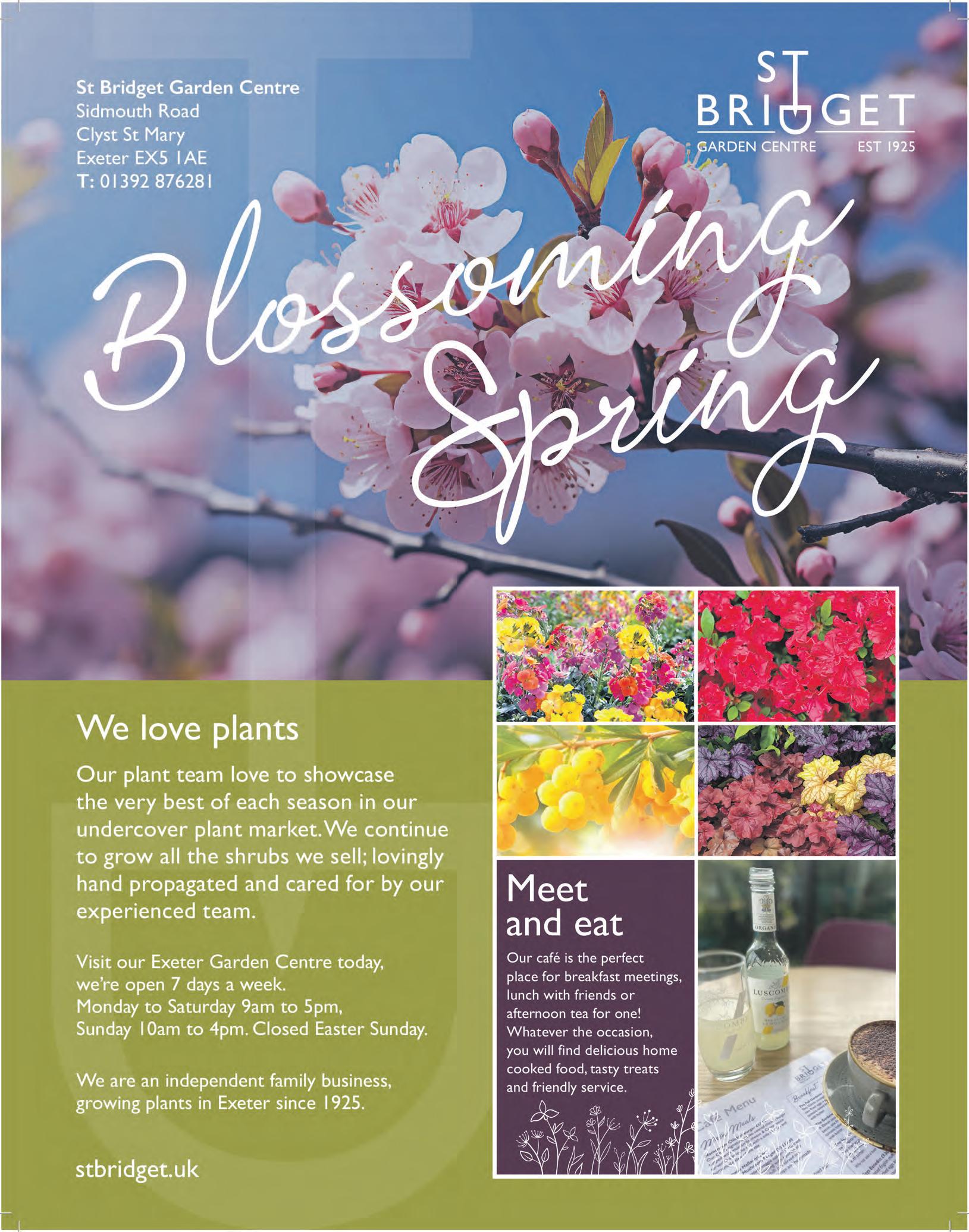








Otter Garden Centres are giving children the chance to grow their own sunflowers this summer - and the chance to win some fantastic prizes. The garden centre group with four Devon sites in Ottery St Mary, Plymouth, Torbay and Bishopsteignton is offering the seeds as part of the build up to National Children’s Gardening Week. Otter is encouraging children to get growing with a free packet of Thompson & Morgan seeds.

Parents and grandparents can collect the seeds from any of the company’s total of seven branches in the south west and south of England. To claim the free seeds, parents or grandparents simply need to visit the garden centre website and fill in a form. An e-voucher will then be sent containing full information on how to collect the seeds instore. Each packet will contain around 15 sunflower seeds and free advice will be provided on planting to ensure healthy, tall sunflowers.
Later in the year, participants will be asked to upload photos of their tallest sunflower if they would like to enter the competition for great prizes.
Full details can be found at ottergardencentres.com/freesunflower
April is certainly the time to think about your garden and heading to a garden centre for those allimportant plants becomes something of a priority.

Greenfingers Garden Centre in Pound Lane, Exmouth, has to be one of Exmouth’s most fabulous beauty spots and it contains an absolute gem of a cafe, Arc Kitchen and coffee house.
It is easily accessible, with a pushchair/wheelchair ramp and ample free parking. Bounded on one side by the Bapton Brook and surrounded by mature trees and garden centre plants, this must be the most attractive setting for a cafe.
Formerly Streamside cafe, Arc was set up two years ago by Angus and Rosie Robertson. The couple are devoted to supplying customers with freshly prepared food with flavour, using local ingredients as far as possible. Ploughman’s lunches and salads are top of the new season menu which still features lots of Arc’s popular dishes. On those sunny days what better than to eat on the terrace al fresco, or at one of the picnic tables at the edge of the stream.
On Sundays breakfasts are available all day. And for those with a sweet tooth, there’s a big selection of delicious cakes, plus savoury and sweet scones which can all be washed down with tea, coffee or fabulous hot chocolate.
Arc Kitchen and Coffee House, Greenfingers Garden Centre, Pound Lane, Exmouth EX8 3LE hello@arcexmouth.co.uk
‘April is the kindest month. It gets you out of your head and out working in the garden’. - Anon
‘You can have the rest of the year if you will give me April and May’ - Spanish proverb

Inspire a year of garden visiting with the National Garden Scheme’s Garden Visitor’s Handbook 2024 – the essential guide to more than 3,500 gardens opening for the NGS this year. With hundreds of new gardens opening there are new gems to explore and old favourites to revisit, detailed descriptions of every garden, handy maps and calendars.
Country Gardener readers can save £3 on The Garden Visitor’s Handbook 2024, your guide to fabulous gardens across England, Wales, Northern Ireland and the Channel Islands that help support some of the UK’s best-loved nursing and health charities through admissions, tea and cakes.
Order yours for just £14.99 (RRP £17.99) using the code CG24 at www.ngs.org.uk/shop

Have you had the chance to visit the stunning gardens at North Devon Hospice? If not, this summer could be your chance to do so! On Saturday, 1st June from 10am to 4pm, the hospice will host their annual Open Gardens event, with a packed itinerary.
Visitors will be able to explore the tranquil hospice gardens before attending a ‘Gardeners’
Question Time’ with head gardener Ian Smith.
A plant sale stall is part of the open day, offering a variety of plants. Alternatively, you can find out more about giving your time to help ensure the gardens remain a haven for patients, families, and visitors to the hospice and you can visit the volunteer stall to find out more.
There will also be live music and a BBQ on the Terrace Café Balcony.
Entry to the hospice’s Open Gardens is free but donations to support the charity’s vital work caring for local people facing a life-limiting illness, now in their 40th anniversary year, and beyond, will be welcome.
To find out more, visit northdevonhospice.org.uk or call 01271 344248.


New research carried out in the west country has revealed the rose as the most popular flower for gardeners.
Somerset plant nursery Ashridge Trees analysed monthly searches over the past year for 20 common flowers to determine their popularity.
The research comes at the perfect time as people prepare gardens for plants– with March considered the key month for beginning a new gardening project, with the soil moist, and the weather hopefully getting warmer.
It is no surprise the rose takes top spot, probably the most romantic flowers and available in so many forms from standard to bush to climbing and part of the love gardeners have for them is the huge array of colours available.
Following in second place was the sunflower.
In third place was the poppy.
Ranking fourth was the hydrangea.
Hydrangeas have big, rounded petals that produce a sypherical shape and can be found in a range of colours, such as blue or white.
Rounding out the top five was the peony, one of the most romantic flowers, with lush, full blooms that are most popular in shades of pink.

Over 200 exhibitors including award winning plant nurseries and one of the best line ups of speakers seen in the west country will be awaiting visitors at Toby’s Garden Festival on Friday, 3rd and Saturday 4th May. Celebrating its 10th anniversary, the popular festival again promises two days of delight, celebration and inspiration for gardeners and lovers of the great outdoors, in the stunning grounds of Powderham Castle, near Exeter. Hosted by BBC Two Gardeners’ World presenter Toby Buckland, on Friday 3rd and Saturday 4th May, the family friendly event boasts an impressive programme of free gardening and food and drink talks, demonstrations, tastings and workshops plus live music.
Headlining Toby’s Garden Festival this year alongside Toby, are fellow BBC Two Gardeners’ World presenters, Rachel de Thame and Sue Kent. Broadcaster, writer and passionate gardener, Rachel hosts talks on Saturday 4th, giving attendees insights into her gardening ethos. Other speakers include blogger, beekeeper and veg grower Olga Grieves, and garden writer Becky Searle.
Much more than purely a garden festival it’s an unmissable two days, with exhibitors including award-winning RHS Chelsea Flower Show plant nurseries and British-grown trees, roses, border and wild flowers, aquatics, shrubs and houseplants plus sculptures
The world-renowned Wildlife Photographer of the Year exhibition, on loan from the Natural History Museum in London, and staged at Seaton Tramway will be open until Sunday, 21st April featuring 100 exceptional images which capture fascinating animal behaviour, spectacular species and the breath-taking diversity of the natural world.
It’s the chance to view the 100 winning photographs out of 49,957 entries into the competition by photographers of all ages and experience levels from 95 countries.
Open 10am to 4pm: entry £7.
Seaton Tramway, Harbour Road, Seaton, Devon EX12 2WD
and garden furniture and an ‘Artisan Barn’ showcasing local artists, crafts, ceramics, textiles, glassware and jewellery. Returning for a second year, Food Drink Devon’s food and drink market is in the castle’s beautiful courtyard. Featuring 20 local producers there’ll be the chance to meet the makers and sample some of the county’s finest food and drink.

For those who want to make a special day of it, Toby’s Garden Festival’s VIP Experience, which not only grants visitors entry into the festival but also, all-day access to 14th century Powderham Castle’s breathtaking library and music room with morning tea, coffee and biscuits, canapés and a light buffet lunch, afternoon tea, a glass of fizz and a VIP gift bag. Tickets are very limited and cost £90 and are valid for one day of the festival only.
After a morning spent at the festival you can, take time out to refresh in Powderham Castle’s music room and library, where you will enjoy a selection of freshly made cakes and your choice of teas or freshly ground coffee (please note this available only after 2.30pm). Tickets cost £30 and include entry to the festival.
Book your tickets for the festival in advance for £13.50. On the gate £15. www.tobygardenfest.co.uk
Toby’s Garden Festival, Powderham Castle, Kenton, Exeter EX6 8JQ
Spring is really under way now and there are beautiful gardens awaiting visitors in Devon during April, where you can have a wander, enjoy a cuppa and cake, and know you’re helping to raise much needed funds for nursing and caring charities supported by the National Garden Scheme.

MUSSELBROOK COTTAGE GARDEN, Sheepwash, Beaworthy, Devon EX21 5PE opens for the NGS on Friday 19th, Saturday 20th and Sunday 21st April from 11am until 4.30pm each day, a one-acre naturalistic/ wildlife/ plantsman’s/ sensory garden, with year-round interest including rare and unusual plants, 13 ponds(koi, lilies), stream, Japanese garden, Mediterranean garden, wildflower meadow, camellias, magnolias, rhododendrons, acers, hydrangeas, grasses and bamboo.
There’s also clock golf. Admission £5, children free. Also opens regularly for the NGS in May, June and July, for more details go to www.ngs.org.uk

POUNDS AT HEMYOCK, Cullompton, Devon EX15 3QS opens for the NGS on Friday 19th and Saturday 20th April from 1pm until 4pm, a cottage garden of lawns and colourful borders set within low flint walls with distant views; an acer grove leads to a swimming pool amid scented borders; traditional ridge and furrow orchard, fruit and ornamental trees, raised beds for vegetables and flowers for cutting. Admission £5, children free, homemade teas available, wheelchair access, dogs allowed and this is a venue offering accommodation. Group visits for the NGS available, for more details and other openings for the
NGS during the summer go to the NGS website as above. WHITSTONE FARM, Whitstone Lane, Bovey Tracey, Devon TQ13 9NA opens for the NGS on two Sundays in April - 21st and 28th, 2pm-5pm each day.

Nearly four acres of steep hillside garden with stunning views of Haytor and Dartmoor, bluebells throughout the garden, arboretum with more than 200 trees from all over the world including magnolias, camellias, acers, alders, betula, davidias, sorbus, rhododendrons and cornus; National Collection of late flowering eucryphia, and hydrangeas. Admission £6, children free, pre-booking essential, homemade teas available, and group visits for the NGS by arrangement, for more details go to ngs.org.uk
Rhododendron lovers will be able to soak up the remarkable diversity of colour, size and shape of these stunning stars of spring at the RHS Garden Rosemoor National Rhododendron Show over the weekend of Saturday and Sunday, 20th and 21st April.
It’s an opportunity to view over 60 classes of rhododendron as well as stunning displays of camellias and magnolias.

Exhibitors come from all over the south and west, including the Royal Parks Department, Exbury Gardens and several National Trust properties in the southwest as well as Caerhays Castle Gardens, Cornwall, famous for its stunning magnolias. The event opens at 11.30 am on Saturday after judging and is open to 4pm.
Everyone is invited to enter the competitions, free of charge - show schedules and entry forms can be requested by emailing the RHS Shows Competition Manager, Georgina Barter at georginabarter@rhs.org.uk.
Easter promises again to be a busy time at the RHS Devon Garden Rosemoor.
From Friday, 29th March to Sunday, 14th April daily 10am to 5pm in the garden you can join in the giant egg hunt to win a chocolate prize and discover the garden in all its spring glory.
On Monday, 8th April from 10.30am to 12noon, in the garden and Learning Centre you can join the education team for a ‘welly walk’ adventure, followed by a craft or planting activity to take home and a relaxing drink to finish.
Other Easter events are also planned over the holidays and details are available at www.rhs.org.uk/gardens/rosemoor
RHS Garden Rosemoor, Torrington EX38 8PH

From March until September, gardeners across Devon will open their gates to the public, welcoming them to explore their beautiful green spaces in return for a donation to Hospiscare. There will be a wide range of gardens to visit, including beautiful estates, community gardens, and quaint cottage gardens. Along with admiring the stunning flora and fauna in each garden, visitors will have the chance to exchange gardening advice and tips with one another. Many gardens also provide refreshments, including hot drinks, homemade cakes and afternoon tea.
Laura Robertson, Fundraising Projects Manager at Hospiscare, explains “ Thanks to the generosity of our supporters, Hospiscare Open Gardens has raised over £400,000 to date and we can’t wait to see what our gardeners have planned this year!”
The annual fundraising event is a vital source of funds for the local hospice, which is currently facing a £2.5 million funding shortage, putting its services seriously at risk. It costs £10 million a year to provide their specialist care and with just 18 percent of their funding provided by government funding, they rely on fundraising for the remaining 82 per-cent.
To find your nearest open garden, visit www.hospiscare.co.uk/gardens for the full selection, along with opening dates and details. If you’re interested in opening your garden for Hospiscare this year, please contact fundraising@hospiscare.co.uk or call 01392 688020 to find out more.
As the busiest time of the year gets under way gardeners should not forget local independent nurseries. They have plenty to offer. Teign Valley Nursery are a great example, a family run nursery situated in the beautiful Teign Valley on the edge of Dartmoor who are now busy growing and selling colourful patio and bedding plants and a wide selection of shrubs, perennials, climbers, roses and alpines. Most stock is grown on site or sourced from local growers. They are also stockists for Frank Matthews Trees for Life, and specialise in planting up hanging baskets to order and are always happy to give free, friendly gardening advice.

The shop stocks a comprehensive and competitive range of gardening essentials and pet and animal supplies and promote local produce and host a weekly small, but popular farmers market.
Teign Valley Nursery, Bridford Nr Exeter EX6 7LB Tel: 01647 252654
teignvalleynursery@gmail
The Devon County Show in May is a mecca for gardeners, and this year’s show is no exception.
We are delighted to be able to offer six pairs of tickets on Thursday, 16th May, the opening day of the show, to give away to readers in an exclusive competition. All you have to do is answer the simple question and send your answer on a postcard to Devon County Show Tickets, Mount House, Halse, Taunton Somerset TAA 3AD to reach us by Wednesday, 1st May.
A key theme for this year show is accessibility and inclusivity and will be a major feature of the Crafts & Horticulture Marquee, one of the most popular features of the show. Organisers are working in partnership with local charity Devon In Sight, to build a sensory garden featuring planting and accessories designed to evoke all the senses, with a focus on touch, smell and sound. Look out also for and edible garden installation, shop for plants and seeds, and gather inspiration from (or even enter) the incredible floral art competition entries. Be there on day one, and you may get the chance to rub shoulders with Devon celebrity,
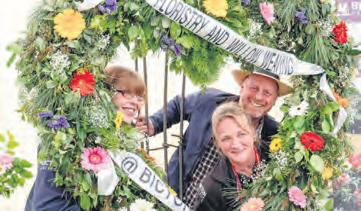
local hospitals, schools, recovery groups and mental health wards.
Patrick is delighted to make an appearance at this year’s Devon County Show, officially opening the Crafts & Horticulture Marquee on the first day, dressed in his specially tailored mayoral robes.
The Devon County Show takes place on Thursday 16th, Friday 17th and Saturday 18th May. Tickets are now available to order at www.devoncountyshow.co.uk
Country Gardener has obtained six pairs of adult tickets to give away on Thursday 16th May, for your chance, to win a pair of tickets answer the following question:
Patrick the Pony is mayor of which Devon village? A. Cockington B. Chulmleigh
C. Croyde

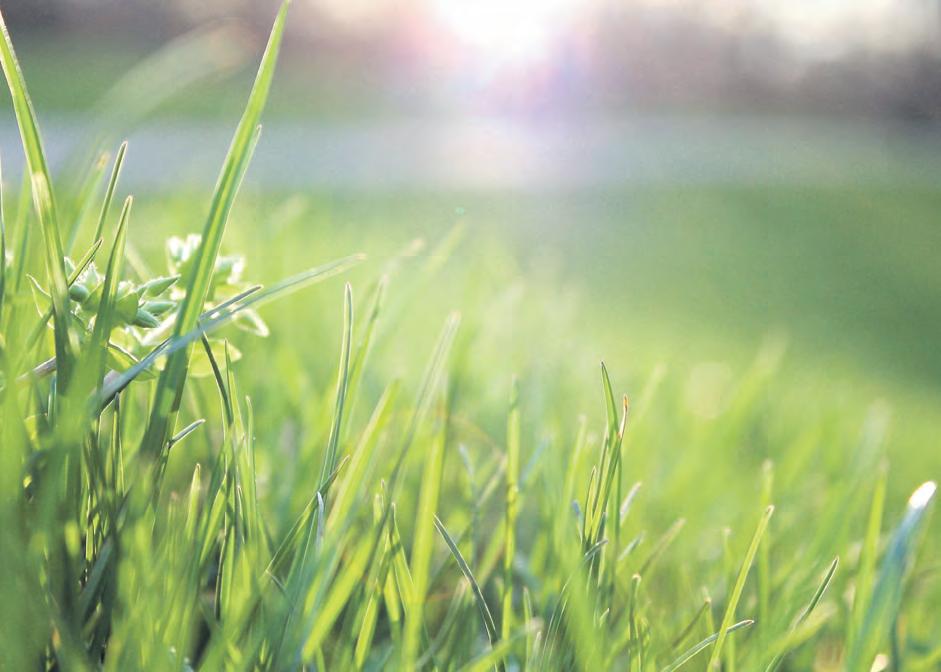






























































































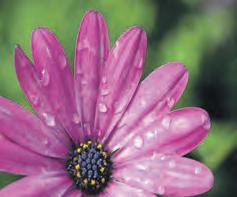


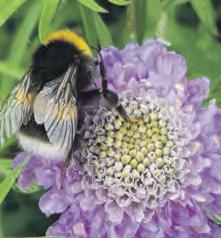












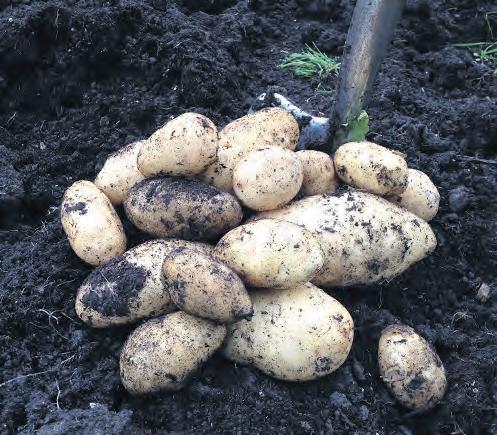



There are several basic requirements gardeners need when it comes to growing vegetables. As the new season starts with the longer days and hopefully warmer weather it is a question of making life as easy as possible.
That means choosing the right variety of vegetables to grow. It remains the most important decision of all.
We need our selections to be reliable, widely available, straightforward to grow and not too prone to pests and diseases. Given those criteria it’s then down to us. March and April can see a wide variety of crops being sown, some which may suit the greenhouse better and it may be a few weeks before the threat of frost has passed and it is safe to plant outdoors.
But when it comes to choosing the varieties most likely to succeed here’s a selection of gardener’s favourites:
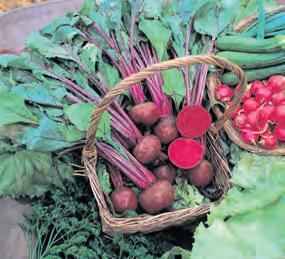
Beetroot ‘Boltardy’
This is a classic red beetroot, easy to grow which will sit happily in the soil until you are ready to pick it. It should be sown direct into the soil between March and May. Remember to sow little and often so you get a regular harvest throughout the summer. Pick when on the small side is not much bigger than a golf ball.
Carrot ‘Flyaway’
This variety has become increasingly popular recently because of its resistance to carrot root fly which can deter growing carrots with its unsightly holes in the roots. Always sow direct into the soil. It will need little attention other than some thinning out later in the spring.
Potato ‘Charlotte’
A delicious potato which is waxy in texture and has a great taste. It is a variety which is resistance to pests and diseases and has been shooting up the popularity lists with gardeners and especially allotment holders over the past few years. It makes a great salad potato. Plant from April onwards.
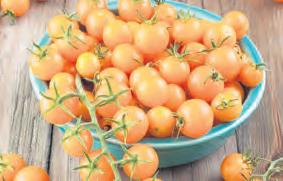
Tomato ‘Sungold’
This is a variety which is famous amongst growers for its sweetness and its intense flavour. It ripens with a golden orange, light red colour and has little history of disease problems. You can grow from May onwards outside but this is a variety which loves the warmth of the greenhouse or a warm windowsill and can be sown from March onwards.
Great texture with very high yields. Two plants will be enough to sustain a family
GROWING VEGETABLES CONTINUES TO ATTRACT NEW CONVERTS AS MILLIONS OF GARDENERS ALREADY GEAR UP FOR A NEW GROWING SEASON. SELECTING PROBLEM FREE VARIETIES IS HALF THE BATTLE
throughout the summer. It is a disease resistant variety. Sow either indoors from midApril or direct in the soil outdoors from May.

The easiest to grow are the loose leaf selections such as ‘ Salad Bowl ‘which once established you can pick the leaves a few at a time to avoid waste. Sow direct in the ground or in seed trays undercover from March to June. Sow seed on moist, well-prepared soil or compost. Cover with a very thin layer of compost or vermiculite. Thin seedlings out and remember to keep sowing every week so you get them throughout the summer.
Easy to grow and very popular because of its very high yields. It produces lovely whiter flowers before the tender beans mature. Best sown direct into the soil from mid-May onwards. Sown any earlier and it might take a while to establish itself.

Broad bean seeds give you a crop that really is best eaten fresh from harvest. Full of nutrients, they are easy to germinate and grow. An upright, bushy half-hardy annual which is easy to grow. This heritage variety broad bean has glaucous green leaves and clusters of black and white flowers, followed by slender pods to 20cm long, with seven or eight green-skinned white beans per pod. They are sturdy plants but as they grow to two feet and more it is best to support them with a network of poles and string to stop them falling over and rotting.
Sweet corn ‘Swift’
Well known and loved by gardeners and a variety which has a great reputation for ripening well and having a great taste. Wind pollinated so must be planted in blocks rather than in a row. Sow in the greenhouse from mid-April to mid-May. Outdoors you might have to wait until late May.

Cucumber ‘Burpless Tasty’
This wonderfully named variety produces crispy, delicious fruits with no bitterness which as the name suggests is easy to digest. Fast growing and with high yields it will grow to about 18 inch but can spread out a lot.
Runner Bean ‘White Lady’ Sweetcorn ‘Swift’


Yes please
✓ All cooked and uncooked food waste
✓ Bread and pastries
✓ Dairy produce
✓ Eggshells
✓ Fish and bones

✓ Fruit and vegetables, including peelings
✓ Meat and bones
✓ Pasta and rice
✓ Tea bags and coffee grounds




Uneaten pet food and cut flowers
No thanks
Compostable packaging Garden waste
Anything other than food waste, uneaten pet food or cut flowers

You can use any bag to line your caddy e.g. an old bread bag, empty salad bag, frozen food bag, old carrier bag, compostable bag or newspaper.



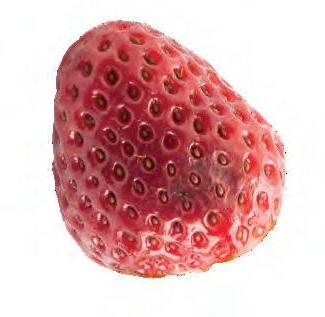

















April sees longer days and hopefully warmer temperatures. Spring bulbs bring welcome colour to borders and pots and the veg garden starts to fill up with new plantings. There’s plenty to do to get your garden in shape but don’t panic, take things one step at a time and you’ll get it all done. It’s important to take a few moments to sit in the sun, listen to the birds and plan your gardening.
The lengthening days however do make it the perfect time to set up the garden for summer.
If you haven’t already sown sweet peas now is your last chance. Sow into deep pots or root trainers as they dislike disturbance to their roots. Or, instead, look out for young plants in nurseries and garden centres. Check whether they are grown for scent or for cutting. Some longer stemmed varieties may smell less strongly.

Sow marigolds, petunias, nasturtiums, asters, zinnia and salvia indoors or in the greenhouse.
Outdoors you can sow native wildflowers and hardy annuals such as poppies and sunflowers.
Bringing dahlias in for the winter doesn’t just protect them against frost. It also allows them to dry out properly, and helps you bring them on a bit earlier.
They’re now ready to be planted.
Give tubers a sprinkling of water in early spring, and they’ll start to produce young shoots in April.
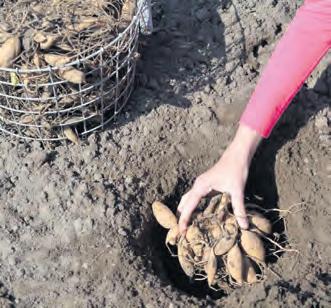
Dig a planting hole, making sure it isn’t too deep. The shoots are still delicate, and you don’t want to damage them.
Gently pour coarse sand over the tubers; this prevents them from rotting and it’s also a great slug repellent.
Backfill with soil and add a ring of sand to mark the planting spot.
5

April, as they say, is the cruellest month with sun one minute and frosty mornings and bitter winds the next. In the April garden tender young leaves are prone to frost burn and judging what to do when is tricky. It’s all a question of timing.
So, roll your sleeves up, grab your tools and sow, plant, feed and tidy. It’s good for the garden and good for the soul… 2
The soil should now be warm enough for seeds to germinate so, once the nights begin to warm up find room for carrots, parsnips and beetroot. Start sowing spinach and chard. These can go direct into the soil and will need to be watered well until they get going. Avoid letting them dry out or they might bolt.

Sow broccoli, kale and Brussels sprouts for winter. Sow individual seeds into modules and leave to germinate either in the green house or a windowsill. They should appear within a couple of weeks. Once they have reached about four inches they can be hardened off and then planted outside.
Sow runner and French beans two to a small pot indoors or under glass. Keep the soil moist and they should soon germinate.
Potatoes need to be planted this month. New potatoes go in early to mid April. Maincrops follow in the second half of the month but exactly when you plant your potatoes will depend on local conditions. The key is to avoid emerging foliage being burned by frost. New potatoes (also known as First and Second Earlies) should be spaced a foot apart.

It’s one of the oldest clichés in gardening: the answer lies in the soil. And as all good gardeners know, it’s true! Improving soil now will pay dividends come summer, resulting in bigger crops and more flowers. Buy sacks of well-rotted manure and dig or fork it into border soil and vegetable patches (don’t let manure touch stems of shrubs and plants). If you don’t have access to manure, the contents of your compost bin can work wonders. Open the access hatch at the bottom and if the material inside is brown and crumbly, it’s a nutrient-rich wonder that’s ready to be dug into soil.
More April garden jobs
• Keep azaleas and rhododendrons looking good by pinching off fading flower heads above a new set of leaves.
• Deadhead early flowering primulas as early as possible, as they tend to cross-breed very easily.
• Early April is your last opportunity to hard-prune late-flowering shrubs.
It doesn’t matter how small your outdoor space is, there’s always an opportunity to grow your own vegetables and fruit, even on a patio or balcony. You will have to water and feed container-grown crops more rigorously than those in the ground.
Which pot or container for growing produce?
There’s lots of choice. There are tiered strawberry pots, which can look wonderful when well cared for.There are veg trugs, raised off the ground to waist height, where you can mix and match low-growing leafy crops such as lettuces, herbs and courgettes.
Pots come in all shapes and sizes, although if you’re planning to grow a long-term patio fruit tree for instance, your pot should be rugged, squat and frost-resistant. Bush tomatoes with a tumbling habit can be grown in hanging baskets, as can strawberries and shorter chillies. Large pots are useful for tripods of vegetables, including climbing beans, and colourful garden peas.
You can use a variety of materials for summer use, including baskets, galvanised metal and glazed pots.
Make sure, whichever pot you choose, that there’s a good-sized drainage hole in the base.
• Stake your perennials before it’s too late. Create attractive willow or hazel structures.
• Remove pure green branches from variegated shrubs, such as elaegnus, privet and euonymus – cut them right back to the main stem with secateurs.
• Start spraying roses using an organic-approved garlic formula; the key is to start early and spray often.
It’s a good idea to order your seeds well in advance so you’re ready for good weather. Clear out the shed, wipe down the potting table and wash the seed trays and pots so they’re free from pests.
Sow your seeds into a variety of different trays, modules and pots, depending on what you have and how large the plant is going to get. The pots should be plastic not terracotta pots, which dry out too quickly because the terracotta absorbs water from the soil.
Smaller plants such as lettuces, cosmos, marigolds and basil can all go into trays. Plants that are going to be more substantial and have strong roots, such as leeks, tomatoes and squashes, should be sown into modules.
Which is better pots/trays or modules?
The advantage of modules is that it keeps the roots of each seedling separate and so avoiding tangles when you come to planting out. The disadvantage of modules is that some are tricky to push the young plants out. They work best when the roots grow enough to form a network which holds the plant plug together.
Hinged module trays known as rootrainers that allow you to remove the plant more easily are now available, but be prepared to pay quite a lot more for them compared to ordinary seed trays.
Seed trays are great for things like lettuces which are more delicate and won’t form much of a root system before planting.
Pots are good for herbs like parsley and basil as they offer the chance for the roots to travel down and establish before planting out. You should use a proper seed compost for sowing seeds. Ordinary garden soil will be full of weed seeds and either overly nutritious or almost inert, depending on where you live.

If you have a greenhouse, sweet peppers are a must. They’re one of the easiest crops to grow and have a multitude of uses in the kitchen – adding flavour and crunch to stir fries, summer salads and fajitas. Red, green and yellow varieties are commonly available. Seeds should be sown as soon as possible this month, placing seed trays or pots in a propagator at around 20°C. Once the first pair of leaves have formed, seedlings should be pricked-out into pots. Sweet peppers thrive under glass, but can also be grown in containers outdoors after all danger of frost has passed.
• To avoid risk of infection, stone fruits such as plum, cherry, peach, nectarine and apricot should only be pruned during the growing season. Prune late April, when the plants are in leaf and after flowering. Immediately seal all cuts greater than one centimetre with wound seal.Repot your citrus in fresh citrus-specific compost. If you can’t find this, ericaceous is the next best thing.
• Top dress blueberries grown in pots with ericaceous compost. It’s important to have two different varieties of blueberries to get good production – they will fruit without, but you’ll get a paltry quantity.
• All soft fruits, for example strawberries, raspberries, redcurrants, blackcurrants, and gooseberries, will benefit from a mulch. Garden compost, leaf mould, organic manure, straw, hay and spent mushroom compost can all be used.
In April, start off half-hardy annuals, such as cosmos, marigolds and zinnias, from seeds for colour in summer. Alternatively buy plug plants online and pot them up in a compost for raising young plants. If plants arrive in the post, take them out of the box straight away so they’re exposed to light.
Climbing plants head skywards as temperatures rise. Some, such as passion flowers, are masters of clinging on, using tendrils to firmly attach to supports. Others such as climbing roses and honeysuckle may need a little bit of help, especially if conditions are windy. Use garden twine or string to anchor new growth to supports. Installing trellis can help, too. Obelisks offer shelter and support for climbers while looking ornamental in borders. In an ideal world one would only grow a handful of plants that need support, but in small gardens and where plants are drawn up to reach for light, this will be necessary. Hazel twigs are excellent, but steel hoops are most easily installed. Make wigwams for sweet peas and climbing beans.

As light levels increase and temperatures rise, houseplants put on new growth. Increase watering and start liquid feeding – general purpose feeds such as Baby Bio cater for a broad spectrum of houseplants, while specific feeds are available for orchids and citrus. If a houseplant looks unhappy and has been in its pot for two or more years, it may need to be re-potted (roots bursting from drainage holes at the bottom of the pot are a tell-tale sign). Choose a slightly larger pot and fill with houseplant or loam-based compost. Never use houseplant compost for orchids though, which need an open, bark-based orchid compost that allows air to reach the roots.
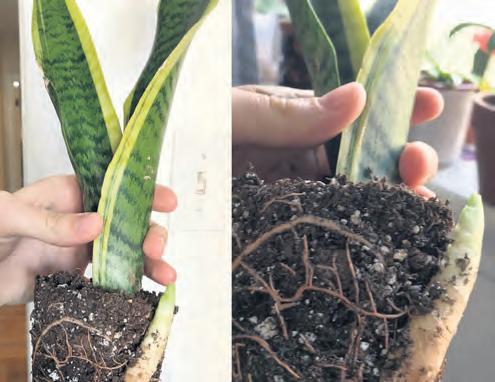


Use an ericaceous feed and gently hoe it into the surface of the soil. If plants are growing in containers, remove the top few centimetres of compost, and replace with fresh ericaceous compost and controlled-release feed for ericaceous plants. Remove any weeds around your plant and cover the bare soil with a mulch, such as garden compost or well-rotted manure. This will help to conserve moisture in the soil.
Most camellias just need a light prune after flowering to keep them in shape. Overgrown plants can be cut back hard if needed. They will send up new shoots from the base. You’ll miss flowering for a few years, but they will recover.
FRI 3 & SAT 4 MAY 2024 10AM TO 5PM



Join BBC TV gardeners Toby Buckland, Sue Kent and Rachel de Thame for our 10th anniversary celebration
Two days of plant shopping, delicious food, music, free garden talks and workshops

THE FIRST GARDEN FEST TO GO CARBON
• Plants galore from the best plant nurseries in the West
• 200 stalls and exhibitors, including top quality arts and crafts
• Mouth watering locally made street food
• Drinks talks and wine tasting
• Food and drink Devon special with Mark Diacono and Susy Atkins
• Join us for Tea in the Castle - a special afternoon treat in Powderham Castle’s Music Room
SECURE YOUR DISCOUNTED TICKETS TODAY!
NEW SEASON IS ALMOST HERE AS GARDENING VENUES REACH OUT TO VISITORS WITH SPRING IDEAS FOR GREAT DAYS OUT - THE BEST INDICATION THAT WE’VE SEEN
How many times during the winter months do we long for spring? Well it’s almost time to dust ourselves down and start to enjoy longer, warmer days to the full and while many of us prefer some sort of hibernation during the long winter months now there are signs we can start to celebrate the new gardening season.
The clearest signs are the number of garden venues who are reaching out to visitors with their new season offerings - everything from daffodil days to trips to Cornwall, to garden visits, plant fairs, days out at an NGS garden and garden festivals.
And while March saw a number of events starting to appear in the calendar, now we are steaming towards April, the diary is bursting with events all over the south and south west.
So, with that in mind we’ve lots of ideas as you start to plan those great days out.
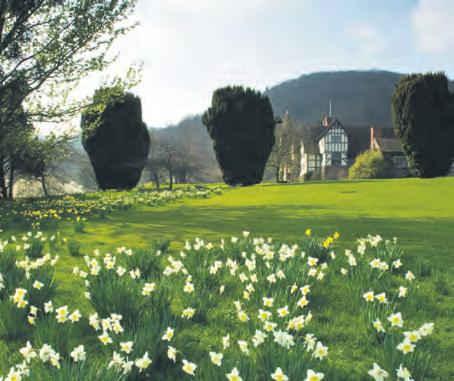
The picturesque gardens at Little Malvern Court sit below the wooded slopes of the Malvern Hills, with far-reaching views across the Severn Valley to the Bredon Hill and the Cotswolds. Features to look out for in May include the beautiful pots of tulips, grouped according to colour, surrounding the house. The varied flowering cherries and crab apple trees will be in blossom. Wildflowers begin to appear in the grass banks and lovely blue camassias pop up in the tall grass of the meadow. In the rose garden, alliums literally burst into flower and the early roses start to open.
There are cedar trees, planted from seeds brought back from the Holy Land by Charles Michael Berington. The chain of lakes, formerly fishponds for the monks, follow the layout from a plan dated 1720 and, like much of the garden, were restored in the 1980’s.
Little Malvern Court & Gardens, Little Malvern WR14 4JN Tel: 07856 035599
www.littlemalverncourt.co.uk

The Royal Bath & West Show returns on 30th May and 1st June, with the Woodland and Countryside Arena offering exciting and creative attractions.
The Dorset Axemen will be performing their ever-popular displays, and there will be a horse logging demonstration through the arboretum. Visitors can also indulge their creative side by producing their own wooden wand at the Amerton Art Studio, using traditional child-safe techniques. Woodland walks are also available, with an interactive map and worksheet to complete. These entertainments are available on all three days of the show, so you won’t miss out whichever day you choose to visit! To book visit www.bathandwest.com.
Royal Bath & West Show,The Showground, Shepton Mallet BA4 6QN

Forde Abbey hosts its high-profile Plant and Gardening Fair on Saturday, 6th April just part of a busy programme of events at the popular gardens near Chard. There will be specialist nurseries selling plants and craftsmen with brilliant gardening sundries from 10.30am to 3.30pm.
The fair takes place at the beginning of the Abbey’s popular tulip display, a time to see the garden waking up from its winter hibernation. The coffee shop will be open throughout the day serving hot drinks, light bites and homemade cakes. The award-winning gift shop with some souvenirs will also be open, The Abbey’s in-house plant nursery is also open from 10.30am. All the plants are grown at the Abbey. The gardens will remain open until 5pm (last entry at 4pm).
A reduced entry fee of £5 to the Plant & Gardening Fair, including admission to Forde Abbey’s 30-acre gardens. Parking is free. (The admission fee applies to all visitors including children over 15).
Ford Abbey, Chard, Somerset TA20 4LU
Immerse yourself in the beauty of spring blossom at Batsford Arboretum. Home to the National Collection of Prunus (Satozakura Group) cherry trees, Batsford has over 120 flowering cherries throughout the arboretum, as well as 73 species of magnolia, adding pastel hues and pretty pinks to the seasonal landscape alongside carpets of daffodils and spring-flowering bulbs.
Batsford Garden Centre is a haven for garden and plant lovers too, offering a fabulous range of quality, affordable plants and gifts.
Pre-booking is advisable for arboretum visits via www.batsarb.co.uk
Batsford Arboretum & Garden Centre, Batsford, Moretonin-Marsh, Gloucestershire GL56 9AT Tel: 01386 701441


24

10th
Wednesdays and Bank Holidays 11am - 5pm


Come



AND LOCAL HISTORY
by Mary van CollerA perfect gift for all lovers of Dorset Just £19.95 plus p&p Order from www.downstreamdorset.co.uk or www.spiral-books.com
20% of proceeds to DORSET AND SOMERSET AIR AMBULANCE



Easter Sunday & Monday Easter Egg Hunts
Sunday 14th & 21st - Bluebell Sundays and Tulips

Visit this stunning family home with its fascinating collections, exhibitions, beautiful walled and woodland gardens and walks to the beach. Film location for ‘Malory Towers’, ‘The Night Manager’ and more.
* Dogs welcome * Holiday Cottages * * Delicious light lunches & cream teas * House, Gardens etc and Café open until 3rd October
Sunday to Thursday 11am - 5pm (House 2pm -5pm last adm. 4pm)
For more information and special events see www.hartlandabbey.com
Hartland, Nr. Bideford EX39 6DT 01237441496/234


Nestled in the heart of North Devon, Marwood Hill Garden is a hidden gem
Home to four National Plant Heritage collections, this private valley garden spans over 20-acres and showcases three stunning lakes, rare trees & shrubs, and colourful surprises throughout each season. Not only a haven for wildlife, the garden is also the perfect environment to explore and be inspired. Enjoy a day of inspirational and relaxation for the whole family.

Enquiries & Tea Room 01271 342528
Plant Sales & Nursery 01271 342577

e info@marwoodhillgarden.co.uk w marwoodhillgarden.co.uk
Marwood Hill Gardens, Marwood, Barnstaple, Devon EX31 4EA
Tea Room & Walled Garden Nursery
Beaulieu House and gardens welcomes back BBC Gardeners’ World Spring Fair from Friday, 3rd May to Sunday 5th May, celebrating spring plants and gardens. Returning to the Hampshire home of the National Motor Museum, it promises to be a thrilling three days.
Visitors will be able to drop in at the BBC Gardeners’ World magazine stage to join special guests including Adam Frost, Joe Swift and many more. With daily talks from the editors, plus special guests. Each day, you’ll get practical tips, topical advice, and the ultimate growing guide to get the best out of your garden this season.
And don’t miss BBC Gardeners’ World Live, at the NEC Birmingham from 13th to 16th June.
You can purchase tickets at www.beaulieu.co.uk/events/bbc-gardeners-world-fair-spring

Kelmscott Manor - a captivating experience
Discover the captivating Kelmscott Manor, the iconic country home of William Morris. Immerse yourself in the charm of his house, gardens, and nearby River Thames. This Grade I listed house was loved by Morris as an example of traditional craftsmanship in harmony with the nearby village and surrounding landscape, towards the very upper reaches of the Thames. Uncover the remarkable farm barns housing the tearoom and exquisite shop beyond the formal garden walls.
It’s the chance to be inspired to unleash your creativity through the series of free drop-in family workshops led by visiting artists and skilled volunteers.
Kelmscott Manor, Kelmscott, Lechlade GL7 3HJ
For further information visit www.kelmscottmanor.org.uk
Hampshire Plant Heritage Group’s high-profile event amongst their busy 2024 calendar takes place on the early May Bank Holiday Monday, May 6th when it organises its annual grand plant fair with over 20 nurseries, food outlets and other entertainments. The event is being held in Longstock Park, adjacent to Longstock Farm Shop café and garden nursery. The event runs from 10am to 4pm and is free to plant heritage members; £2 to John Lewis employees and £5 for the public. The postcode covers a large rural area therefore if using Google Maps please search for ‘Longstock Farm Shop and Cafe, SO20 6EH’.
Longstock Park, Longstock, Stockbridge SO20 6EH

The season of Rare Plant Fairs continues in April with two fantastic events. The first is a longstanding fair at The Old Rectory at Quenington, near Cirencester on Sunday, April 14th in support of Cobalt Health. The second is set in the stunning 60-acre woodland gardens at Evenley Wood, near Brackley in Northamptonshire on Sunday, April 21st.
Visitors will get see a great selection of specialist nurseries attending both fairs, including several National Collection holders, all of whom are experts in the plants that they grow. There will be a wide range of interesting and unusual plants for sale including choice perennials, plants for shade, rare climbers, cacti, succulents and house plants, alpines, native wildflowers and a great selection of unusual shrubs, all accompanied by the expert advice that you need to select and grow the right plants for your garden.
There are 13 fairs this year. Visit the website at www.rareplantfair.co.uk for details of all the events, including lists of the exhibitors attending.
The Walled Gardens of Cannington is an RHS partner garden with a Grade 1 listed medieval priory backdrop. A mix of classic and modern features, including a ‘hot’ border, sub-tropical walk, blue garden, Mediterranean garden, shade border, Southern hemisphere and a winter garden. It is home to Somerset’s only botanical glasshouse, featuring hundreds of different species from around the world such as the magnificent jade vine (Strongylodon macrobotrys). There’s also a gift shop, tearoom and specialist plant nursery; plants are propagated on-site and sold at great prices. Open Tuesday to Sunday, 10am to 3pm/4pm/5pm (seasonal), year-round excluding two weeks at Christmas, Monday ,1 April and Monday, 8 April Last admission to the gardens is one hour before closure. The gardens hold a variety of events and special offers throughout the year suitable for all age groups. Check the website for further information.
Walled gardens of Cannington Church Street, Cannington TA5 2HA
Tel: 01278 655042 Email: walledgardens@btc.ac.uk


‘Beautiful, hidden gem, vast array of plants and trees, breath taking. Tea rooms a welcome addition. Go and enjoy nature at its best!’
‘Dog friendly and a good little trail for the kids.’
‘Our first visit and we hadn’t expected such a lovely treat. In April there is so much colour, wonderful streams and water features and stunning views of Dartmoor. Nice people as well and good value.’
These are some of the comments from appreciative visitors to the spectacular 25-acre Lukesland Gardens, Ivybridge. Tucked away in a woodland valley on the edge of Dartmoor (just 10 minutes off the A38), Lukesland’s noted collection of camellias, magnolias and rhododendrons provides a spectacular show of colour through the spring. The Addicombe Brook at the heart of the garden is criss-crossed by a series of charming and unusual bridges over pools and waterfalls. There are also many sculptures, including a redwood carved into a buzzard. With delicious home-made soup and cakes on offer in the tearoom, and Free Entry and fun activities for children, these family-owned gardens have something for everyone. Dogs are welcome on a lead. Spring openings are on Sundays, Wednesdays, and Bank Holidays 11am to 5pm from 10th March to 9th June.
For further details call 01752 691749/07479 383531 or visit www.lukesland.co.uk or facebook.com/lukeslandgardens





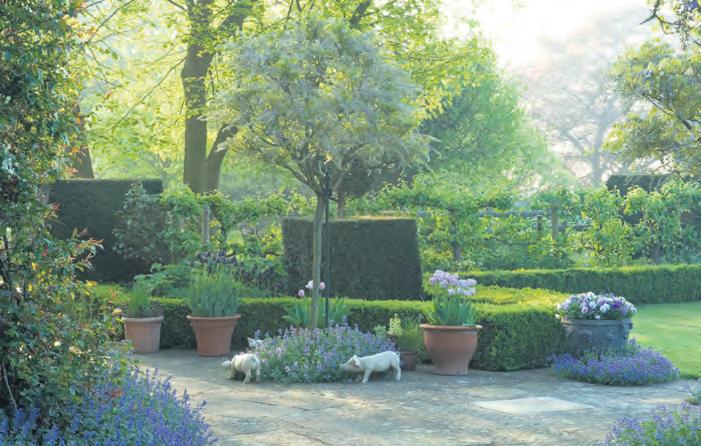
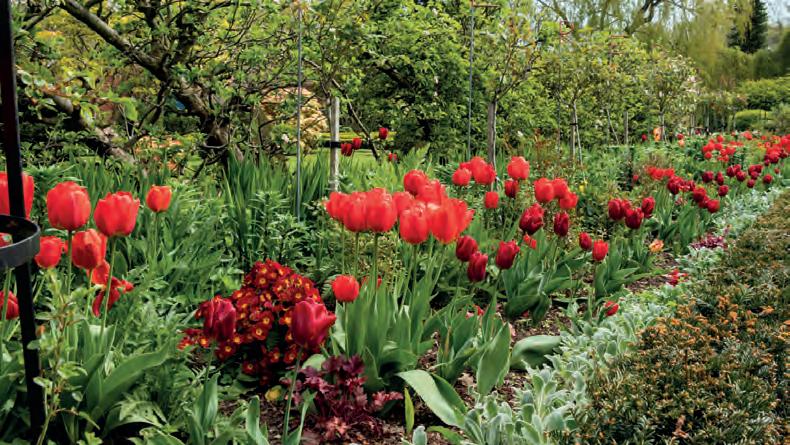




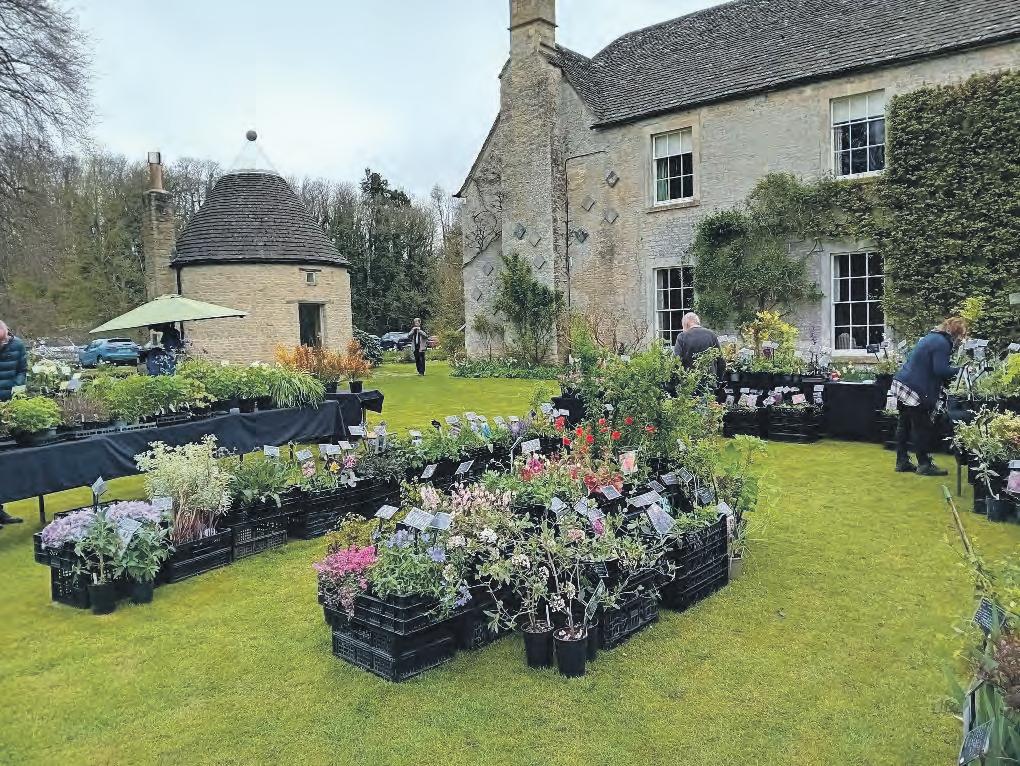


Looking to get away this summer? Well, there are so many great places to discover in Dorset!
Downstream Dorset, River Tales and Local History provides a colourful and truly inspiring exploration of Dorset with its many rivers and riverside towns and villages.
It delves into lesser-known tales and gems of Dorset rich history as well as explaining placenames.
Mary van Coller travelled throughout the county discovering riverside communities and their history before being published by Spiral Publishing Ltd.
It’s just £19.95 plus p&p from www.Downstreamdorset.co.uk or www.spiral-books.com
20% of all proceeds is donated to the Dorset and Somerset Air Ambulance.
April is a busy and beautiful time at Hartland Abbey. Early Easter means many daffodils and narcissi will still be flowering for ‘Easter Egging.’ Children follow clues to their ultimate chocolate dream whilst exploring all the paths around the woodland gardens allowing parents time to experience the best of the spring bulbs and shrubs! Its doggie heaven too!
Bluebell Sundays on April 14th and 21st are a wonderful time to visit the house and gardens at a reduced entry rate. Stunning bluebells stretch from the walled gardens to the sea with wild garlic, anemones, orchids, primroses and violets carpeting the woodland walks. Dazzling tulips and emerging flowers on rhododendrons and azaleas and late camellias make April one of the loveliest times to visit. The beautiful wild flowers on the cliffs at Blackpool Mill start their display too.
Hartland Abbey, Hartland EX396DT
Tel: 01237441496/234
www.hartlandabbey.com
Mark your calendars for the first Badminton House Open Garden Day of the year on Sunday, 21st April. This event promises to be a visual delight, showcasing the beauty of Badminton House gardens, designed by Russell Page and Francois Goffinet. Visitors will be treated to an array of colourful tulips as you explore the historic grounds, pick up some horticultural tips and visit one of the many plant and flower stalls. Refreshments will be available to purchase including teas and hot cross buns inside the Badminton Old Kitchen. Open 10am to 4pm. Ticket prices: £7.50 pre-sale/£10 on the day (65+), £10 pre-sale/£12.50 on the day (adults). Children under 12 enter for free.
The Badminton Estate, South Gloucestershire, Badminton GL9 1DD Book at www.badmintonestate.com



As winter passes, something magical is happening at Forestry England’s Westonbirt, The National Arboretum as spring arrives. The warmer and longer spring days bring the emergence of many forms of new life.
One of the most exciting things to see is new leaves appearing on the trees and flower buds opening. Springtime is also signalled by the sound of songbirds and sights of newborn wildlife. This spring why not join one of Westonbirt’s daily guided spring walks, free after paying admission, to learn more about this beautiful home to wildlife.
Plan your visit, see https://www. forestryengland.uk/westonbirt/wildlife
Boscrege Caravan and Touring park in Cornwall is a peaceful and picturesque park, set at the foot of Tregonning Hill, Godolphin National Trust and amongst a myriad of Cornish lanes in an area of outstanding natural beauty.
The park, which is open all year, is close to the wonderful Cornwall coast and only a few minutes drive to Praa Sands, one of Britain’s nicest beaches. St Ives, Penzance, Hayle, Lands’ End, The Lizard Peninsular, Helston and Falmouth and many other Cornwall attractions and beaches are very easily visited.
So if you are looking to take a luxury holiday (doggie friendly with dog friendly homes and on site designated fields for the dogs too) in a either a self catering caravan, lodges touring or even purchasing your own holiday home then contact Boscrege Caravan and Touring Park.
Boscrege Caravan Park, Boscrege, Ashton, Cornwall. TR13 9TG. Tel: 01736 762231
www.caravanparkcornwall.com










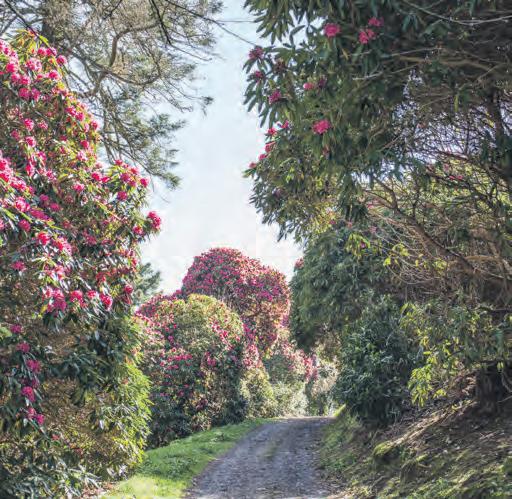


















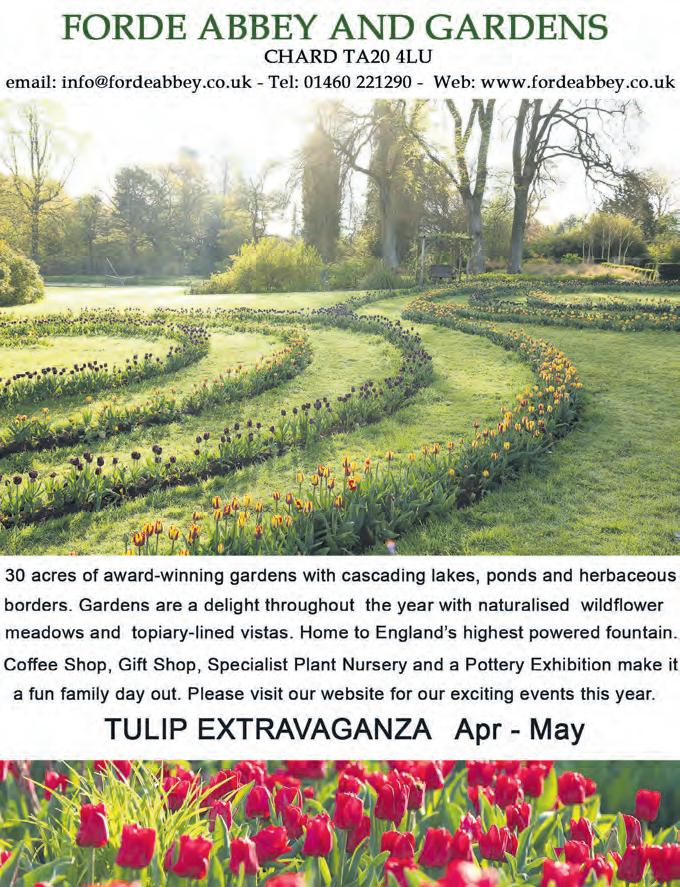
Nestled in a sheltered valley on the south coast of Cornwall near Mevagissey you’ll find the world class, magical 140-acre woodland garden at Caerhays Castle, steeped in history and often described as a spring-time wonderland for visitors. Home to a National Collection of Magnolias, the gardens are also famous for their camellias, rhododendrons and azaleas. Caerhays is one of the Great Gardens of Cornwall.
The gardens are open daily until the 16th June. The castle is open for guided tours from the until the 7th June. Caerhays Charity Fete on Sunday 16th June supporting Children’s Hospice South West.
Caerhays Castle Gorran Churchtown, Saint Austell PL26 6LY Tel: 01872 501310 visit.caerhays.co.uk enquiries@caerhays.co.uk
If you’re looking for a day out with a difference this spring, don’t miss the Palace’s Medieval Falconry Day on Saturday 13th April. Held against the stunning backdrop of the Palace’s Great Hall specialist falconry firm, Raptorcare, will entertain crowds with a day of fantastic flying displays, fascinating information and beautiful birds. Displays at 12pm and 3pm. The palace building, gardens and award-winning Bishop’s Table café will also be open. This event is included with the 12 month admission ticket and membership.
The Bishop’s Palace and Gardens, Wells, Somerset BA5 2PD Tel: 01749 988111
info@bishopspalace.org.uk
www.bishopspalace.org.uk

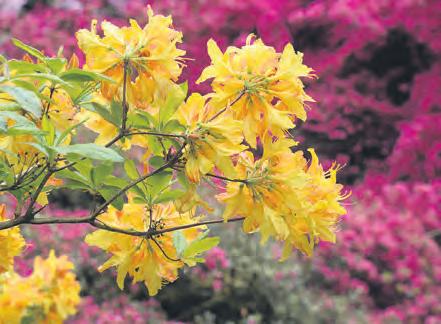
One of the most popular plant sales in the Cotswolds returns on Saturday 27th and Sunday 28th April when West Kington Nurseries hold their ‘massive’ plant sale. Entry over the two-day event is free and visitors with have the chance to wonder over the five acre site of the nursery which promises to be bursting with spring plants and bulbs. Catalogues for the sale are sold in aid of local charities.
Call 01249 782822 or visit www.wknurseries.co.uk for more information. West Kington Nurseries, West Kington, Chippenham. SN14 7JQ

Overbecks Garden at Sharpitor in Salcombe, stands at the gateway to stunning countryside and coastal walks encompassing the South West Coast Path in an area managed and owned by the NT. The garden was created and developed by each family who owned the property in turn, leaving us today with what has been described as ‘a true plantsman’s garden’, packed with tender and exotic species from around the world. Narrow paths lead you through woodland, formal beds, a walled tropical garden, and Mediterranean planting, and the view across the Kingsbridge and Salcombe estuary is unforgettable. A visit to South Devon cannot go by without a trip to Overbecks garden, for essential information please check the website.
Overbecks Shapitor, Salcombe TQ8 8LW www.nationaltrust.org.uk/overbecks-garden

There is a treasure trove of gorgeous National Garden Scheme gardens just waiting to be explored in 2024. As well as the traditional country gardens that have supported the National Garden Scheme ever since the foundation in 1927, today the gardens represent the glorious kaleidoscope that makes up today’s diverse garden landscape. With almost 3,500 gardens, including 908 new and returning gardens, the year ahead is bursting with horticultural promise. And it’s never too early to start planning your garden visits or to book one of the special events.
Find your perfect garden ngs.org.uk

Colour is everywhere at Marwood Hill Gardens gardens with camellias and magnolias in full flower – on display are over 500 different varieties of Camellias flowers, both in the garden and in a large greenhouse in the Walled Garden. This year’s display is one of the best and this truly is a bumper year for flowers.
The Magnolias are responding too, with nearly 100 different kinds covering the bushes with their colourful blooms. Elsewhere Daffodils are creating a colourful carpet beneath the trees and after a glorious walk around this 20 acre garden and lakes, interesting and desirable plants await in thePlant Centre, as well as a relaxing cup of tea or coffee and cake in the Garden Tea Room.
Marwood Hill Gardens, Nr Guineaford, Barnstaple, North Devon EX31 4EA Tel: 01271 342 528
Email: info@marwoodhillgarden.co.uk
www.marwoodhillgarden.co.uk

14


Overbeck’s

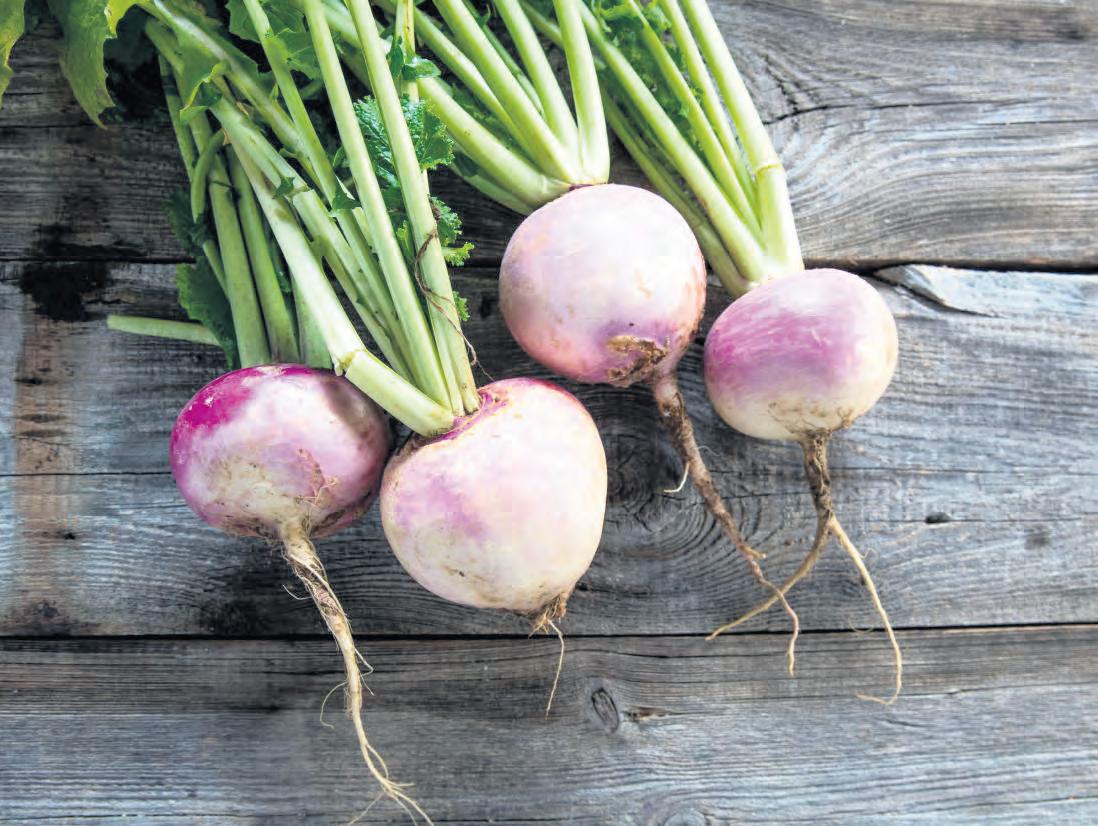
Turnips are easy and quick to grow especially if harvested as baby roots and they are often an overlooked choice in the vegetable garden
Turnips have been grown in gardens and allotments for hundreds of years – and generally looked down on. Ugly, lumpy roots were used as cattle feed and as a winter staple in hard times so they generally had a very poor image when it came to the list of popular garden vegetables.
However, they are worth considering if you are looking for something different to grow this season. Quick growing cultivars with small tops known as baby turnips or baby roots are tender and succulent and have a peppery sweetness - delicious eaten young raw in salads or steam fried.

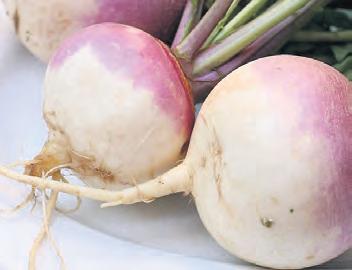
Turnips are quick and easy to grow from seed, forming small rounded or flattened roots, usually with white or purple skins. They are ready in as little as six weeks and are best harvested young, at their most tender and tasty. The leaves can be eaten like spinach too, making this a doubly useful crop.
Turnips like a sunny spot and grow best in cool conditions, in fertile, moisture-retentive soil.
You can also grow them in large containers, for harvesting as mini-veg.
You should sow in small batches every few weeks from spring to late summer for regular harvests without any gluts. The priority is to keep them well watered, especially in dry spells.
The main sowing season is from March to midAugust, although early sowings can also be made in February under cloches or in a greenhouse. Choose early varieties for sowing up to June.
Turnips generally prefer cool conditions, so spring sowings usually germinate quickly and abundantly, while in hot dry weather germination may be less successful.
Turnips like moisture-retentive soil, in an open, sunny spot. Like most root crops, they are best sown direct outdoors, where they are to grow, either in the ground or in large containers. However, they can also be sown indoors.
Small individual cells, usually in a tray, used for sowing seeds. The resulting seedlings can be transplanted with minimal root disturbance.
As they grow so rapidly, turnips are great for filling any gaps that appear on the veg plot after harvesting other crops, or for sowing between slower-growing crops, such as parsnips, for harvesting before the slower crop needs the space.
If you make regular small sowings, you avoid large gluts and can have harvests from early summer through into autumn and beyond.
Choose early varieties for sowing up to June, then maincrop varieties in July and August. Turnips generally prefer cool conditions, so spring sowings usually germinate quickly and abundantly, while in hot dry weather germination may be less successful.
Most varieties will be ready to harvest when the diameter has reached two to four inches. Pay attention to the size at maturity for the specific varieties that you are growing. If you leave a turnip in the ground for too long, it may grow larger but it will also lose its flavour and become pithy.
If you’re short on ground space, or just want a few small or mini-roots, you can sow turnip seeds into containers outdoors in a warm sunny spot.
The choice of tomato varieties available to growers this summer will be daunting but there are choices for every option
One of the true joys of summer to look forward to must be freshly picked tomatoes, warm from the sun and full of flavour.
One of the biggest problems facing gardeners for the new season are the choice of varieties of varieties which are now available. It can be daunting.
However, there is a type, colour, size of fruit and plant for most locations, even the smallest of spaces.
Growing from seed will always give you the widest choice. Premier Seeds Direct offer one of the largest selections of varieties, they trial all varieties themselves to ensure they perform well in the UK.
Growing in a greenhouse will deliver higher yields, however growing outside provided the location is sunny and sheltered can deliver excellent results.
The first decision to make is how large a plant you want. An Indeterminate / cordon which is simply a variety that grows on a single stem with the trusses of classic vine tomatoes every couple of leaves or a determinate / bush varieties that are multi branched, and ideal for container growing or for smaller windowsill sized plants. The choice between an F1 hybrid and an heirloom variety.
Almost every commercial tomato you buy in a shop will be an F1 hybrid, these are more expensive but deliver more vigorous
Some favourites for you to try:
plants, better uniformity, and disease resistance, however, often some of the true tomato flavour is compromised. An heirloom variety is where you find the greatest variety in shape, colours, flavours and texture developed over hundreds of years. You may get slightly lower yields, disease can be a problem, but they have unique characteristics, often more flavour. Disease resistance is an important factor, especially if you are growing outdoors in a poorer UK summer, where tomato blight is in the area. There is nothing more devastation than losing your entire crop just as they ripen over a few days. Luckily breeders have in recent years developed several excellent varieties which provide high resistance, and it is always worth having at least one of these growing. Then it’s simply what sort of tomatoes you like: Beefsteak, standard or cherry, round, plum or pointy, and any combination of colour or even multi-coloured varieties. Try something different this year in addition to your usual favourites, and hopefully you will find a new favourite in the process.
Remember tomato seeds usually germinate in seven to 14 days if you maintain a steady temperature of 21°C. Pot on the tomato seedlings as soon as they're big enough to handle. Hold the plants by the leaves, taking care not to touch the stems, and transplant them into threeinch pots.
Outdoor – 'Crimson Crush' F1, 'Cocktail Crush' F1
Blight Resistant – 'Rose Crush' F1, 'Crokini' F1, 'Merrygold' F1
Heirlooms – 'Cherokee Purple', 'Flame', 'Golden Bumblebee'
Cherry – 'Sungold', 'Sweet Million' F1, 'Cerise', 'Vesuvio'
Beefsteak – 'Burlesque', 'Gigantomo' F1, 'Costoluto Fiorentino', 'Buffalosun' F1
Dwarf / Hanging baskets - 'Maskotka', 'Veranda Red'
All the above are available from Premier Seeds Direct, www.premierseedsdirect.com

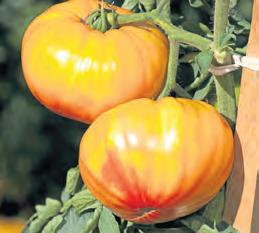

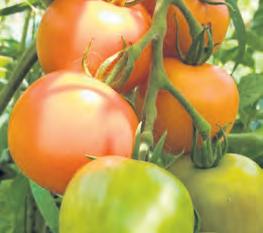


With new technology and the end of a tax on glass, Victorian glasshouses became imposingly vast and allowed many more exotic plants from all over the world to survive in this country

The great glasshouses and conservatories that sprung up in the mid-19th century were an amazing innovation. Some have survived, particularly the Palm House and the Temperate House at Kew Gardens, while others proved to be too expensive to run.
Glasshouses not only became larger as technology improved, but increasingly specialised, so that professional gardeners could concentrate on growing orchids or raising exotic fruit such as melons. This was all helped by the end of a tax on glass in 1845.

The Industrial Revolution made glasshouse production costs drop.
Timber became cheaper to import, paint and bricks could be mass produced, and innovations in the machine tool industry meant an increase in the production of wrought and cast iron. When the glass tax was repealed in 1845, along with the abolishment of window tax in 1851, glass became a more affordable material.
The middle-classes could now afford to build and own glasshouses too. Manufacturers started to produce smaller, plain glasshouses – iron and glass structures, also wooden structures, that could be selfassembled in your own back garden.
One of the most important Victorian gardeners was a great innovator, particularly in the development of glasshouses. Joseph Paxton had a remarkable career, coming from rural poverty to become a professional gardener and only in his early 20s became head gardener
for the Duke of Devonshire at Chatsworth in 1826. Within a couple of years he began experimenting with glasshouse construction and by 1832 Chatsworth’s kitchen garden had 22 hot houses and forcing pits in which to grow exotic fruits.
He preferred wood construction to metal in the construction of glasshouses as he found it more resistant to corrosion, easier to repair and as a frugal person, a much cheaper product. He invented the ‘Paxton gutter’ a wooden glazing bar with an outside channel for catching rain water and to eliminate condensation inside.
He became increasingly captivated by glasshouse design, with the building of the Conservative Wall in Chatsworth’s grounds, which is still standing and is now called The Case. It’s backed by an ingenious system of flues and hot-water pipes, to keep the temperature high enough in the winter for half-hardy plants to grow successfully. Initially, there were projecting wooden panels from which canvas curtains could be hung in the coldest weather, but in 1848 Paxton covered it with a wood and glass frame. The structure is 91m long, and protects figs, peaches, nectarines, apricots and various shrubs from the unpredictable Derbyshire climate.
This was followed by the Great Stove or Conservatory, a glasshouse so large that Queen Victoria and Prince Albert could ride through it in their carriage when they visited in 1843. It continued to amaze visitors and an illustration shows people walking around it. It had taken four years to build, completed in 1840. At 84m long, 37m wide and 19m high, the largest glass building in England before the erection of Paxton’s subsequent marvel, the Crystal Palace in London in 1851. But it proved to be very expensive to run, and during the First World War coal supplies ran low nationally, causing all the plants to die in the unheated building, so the huge structure was blown up in 1920.
Paxton had a special glasshouse built, designed specifically to house the giant water lily from the Amazon in South America, and named after Queen Victoria, Victoria regia later renamed V amazonica. He had
managed to get a giant water lily to flower for the first time in this country. People were fascinated by this plant introduction from South America, which became famous for the illustrations and photographs of a small child, one of the first being Paxton’s daughter Alice, sitting comfortably on one of its huge leaves floating in water. The original Chatsworth lily house is now destroyed, but the plants are still raised in the Display House. It is an annual and still grows at great speed in the pond in the Tropical zone of the greenhouse, the glasshouse team propagating the lily from seed collected from the previous year’s plants.
This success led to his amazing design for the Crystal Palace, built for the Great Exhibition of 1851. Paxton said that the building’s design was inspired by the huge ribbed floating leaves of the great waterlily; 1,851 feet (564m) long and 128 feet (39m) in height, three times the size of St Paul’s cathedral, it proved to be one of the wonders of the Victorian age, standing in London’s Hyde Park where some of the park’s elms were accommodated inside. Later it was dismantled and rebuilt in Sydenham Park, south London, becoming a popular concert venue but dramatically burnt down in 1936, the blaze seen for miles.
Decimus Burton was the architect at Kew Gardens who designed the Palm House and later the elegant Temperate House, built in stages in the 1860s and 1890s. The Palm House was built in 1844 by Richard Turner according to Decimus Burton’s designs. Architects borrowed techniques from the ship building industry to achieve the ambitious project and the Palm House resembles the upturned hull of a ship. It houses not only palms but many rare tropical plants including cycads, prehistoric plants resembling palms, that were widespread more than 250 million years ago, before dinosaurs and well before the appearance of flowering plants.
Imposing glasshouses and conservatories became the ultimate luxury and status symbol for the wealthy, and were emulated round the country in more modest glasshouses in the gardens of middle class homes.


Exotic plants from all over the globe were increasingly sought after by wealthy owners and glasshouse technology allowed these plants to grow in the UK. Nurseries such as those run by the Veitch family in Exeter and then also in London, sent plant hunters out to meet the demand for ever more rare specimens never seen before in this country. Orchids were the height of fashion with a growing craze, and the Veitch company sent Thomas Lobb, a Cornishman, out to the jungles of Malaysia to bring home orchids that could be bred in the nursery and fill not only conservatories but be pinned as corsages on to the ball gowns of society ladies.
A lovely glasshouse that has survived into the 21st century is the Palm House at Bicton Park Botanical Gardens, Devon, near Budleigh Salterton. It was built in 1825, about 20 years before Kew’s Palm House, in a circular design that used single flat panes of glass. The small size of the 18,000 overlapping panes fit smoothly between the curved, thin iron bars forming the roof’s skeleton. The structure is strengthened by slender cast-iron columns in the side
“Manufacturers started to produce smaller, plain glasshouses - iron and glass structures, also wooden structures, that could be self-assembled in your own back garden.”

wings, but the larger central dome is self-supporting. There are no horizontal glazing bars - without the glass the roof would become unstable.
Bicton Park’s Palm House underwent a huge restoration project in1985, with modern glass replacing the original panes, hand-moulded to be thicker at the edges than in the middle so that water would run away from the ironwork.
Ventilation is by rope-operated louvres high up in the rear brick wall, and underfloor heating still operates with large hot-water pipes acting as a huge radiator. Bicton Park is a wonderful place to visit, displaying 300 years of garden history, with its Italian Garden, arboretum and rose garden as well as the Palm House and glasshouses among the 64 acres.
West Dean Gardens at West Dean near Chichester, West Sussex has an impressive collection of 13 working Victorian glasshouses, all built between 1890 and 1900, but were completely derelict before their restoration in the early 1990s. Now there is always colour on display from the large collection of plants including exotic plants, orchids,
The descendants of the great Victorian glasshouses are the biodomes at Cornwall’s Eden project, where collections of tender plants from all over the world can be grown easily. Modern glasshouses sit near the Palm House and Temperate House at Kew.
Victoria amazonica is the most familiar of the giant water lilies, with leaves reaching nearly 3m in diameter, while the leaves of Victoria cruziana are slightly smaller. At Bristol University Botanic Gardens the Victoria cruziana water lily can be seen in its own glasshouse, one of the highlights at the gardens, in the pond in the tropical glass house. Its enormous leaves, which can reach two metres in diameter, are studded with spines on the underside and always provide a wow factor for visiting children and their families.
We have to thank the innovators of the 19th century for their careful designs so brilliantly carried out so that exotic plants could be grown successfully in this country.
strawberry plants, figs, nectarines, peaches, gourds, grapes and melons.
The glasshouses are repainted on a four year cycle; the exteriors over summer, and the interiors over winter, when the glasshouses can be emptied and hand scrubbed from top to bottom, inside and out, a process that takes two gardeners two months to complete.The glasshouses are heated by a woodchip burning boiler which also heats West Dean College and associated buildings using woodchips produced from West Dean Estate’s commercial forestry.
Bicton Park Botanical Gardens, Bicton East, Budleigh Salterton EX9 7BJ. Open daily. www.bictongardens.co.uk
West Dean Gardens, West Dean, Chichester, West Sussex PO18 0RX. Open daily. www.westdean.ac.uk

 Bicton Park’s beautiful Palm House, dating from 1825
A biodome at the Eden Project in Cornwall
Bicton Park’s beautiful Palm House, dating from 1825
A biodome at the Eden Project in Cornwall
Specialist plant nurseries and the nurserymen and growers who work in them are almost a race apart. When it comes to the skills needed to grow and care for plants, they call on a lifetime of experience and knowledge as they propagate and grow almost all their stock themselves.
The network of specialist nurseries, often small and family run are based on remarkable horticultural skills and experience. Many nurseries are open to the public either for general visits or special open days and they provide a wonderful opportunity for the enthusiastic and adventurous gardener to have a unique insight into plants. No-one will know how to care and make the most of a plant more than the grower and one who is keen to share a wealth of experience.
Typically, these specialist nurseries are often tucked away and will supply in bulk to larger gardens and outlets, but whose real strength is to deal directly with the gardening public. They offer great value, high quality plants through online sales and visits to the nurseries themsleves, to some of the best horticulturists in the country.
They also have a great passion for gardening. Which comes across when you get the chance to discuss their plants and what your needs are with the person who knows everything there is to know.



For a truly exotic experience, Burnham Nurseries, just outside Newton Abbot, is the place to go as they are the leading specialist orchid growers. This awardwinning nursery has specialised in these tropical plants for 75 years and has been run by three generations of the same family. Orchids have become even more popular in recent years as a great houseplant to decorate homes and they are easier to grow than many think.
The orchid family is huge with over 150,000 species and hybrids. Many need more specific care, but there are also lots of simple to grow varieties that are perfect for the home. The nursery with its shop, café and greenhouses to browse around, is a gem in the Devon countryside and open all year round. Expert advice on what to purchase is always on hand.
Orchid Paradise at Burnham Nurseries is open Monday to Friday from 10am to 3pm plus one open weekend every month. Tel 01626 352233 or check online at www.orchids.uk.com for dates, lots of orchid info plus online ordering.


Did you know that purple vegetables and fruit aren’t just colourful? These edibles are packed with potent antioxidants that help to promote blood circulation and cellular health, which is great for our skin. They also often contain a more intense flavour.
There are many tasty purple vegetables to grow that not only stand out from the crowd due to their captivating appearance and deep flavours, but also for their health-boosting benefits. Try our favourites: Purple Haze carrots, Midnight Sun kale, French Bean Blauhide, Cauliflower Di Sicliana Violetto all available from www.premierseedsdirect.com
Chrysanthemums Direct are the UK’s leading grower and supplier of chrysanthemum plants to the public. They stock over 480 varieties covering a wide range of different types, including exhibition and garden hardy cultivars. They also sell via mail order and have developed a sustainable packaging solution, which ensures that you receive top quality plants, within 24 hours of dispatch, from their nursery in Cheshire.
Chrysanthemums Direct supply over 1.2 million stems of incurved bloom chrysanthemums for the cut-flower market each year. They also supply these blooms by mail order from May until Christmas directly to the public. Details of all the products are available on the website, www.chrysanthemumsdirect.co.uk

Award winning chrysanthemums through the post with sustainable packaging
Barthélemy and Co, near Wimborne in Dorset, is a Japanese maple nursery that was founded in 1920. From sourcing and picking the seeds, some years over 100,000 Japanese maples are produced and grown each year on the nursery by the Skinner family.
Approximately 10,000 to12,000 of these seedlings go on to be grafted with named varieties, using techniques passed
down through the generations. Their focus on these maples has allowed them to perfect their growing and grafting techniques, producing some of the finest specimens available in the UK.
Barthélemy & Co is not just a place to buy plants, but a living museum of horticultural history, where every aspect of the growing process is done with care and attention to detail. Visitors to the nursery can see the passion and dedication involved on display, and leave with a new appreciation for the beauty and complexity of these unique and captivating trees. 01202 874283
www.barthelemymaples.co.uk

We produce and grow the largest selection available in the UK. Plants are pot grown and suitable for garden, patio or bonsai.
Visitors welcome Mon-Sat 9am-1pm & 2pm-4pm
Barthelemy & Co (DCG), 262 Wimborne Rd West, Stapehill, Wimborne, Dorset BH21 2DZ
Tel: 01202 874283
enquiries@barthelemymaples.co.uk
www.barthelemymaples.co.uk

Chrysanthemums Direct

Holmes Chapel Road, Over Peover, Knutsford, Cheshire. WA16 9RA
Telephone: 0800 046 7443 sales@chrysanthemumsdirect.co.uk
2024 Catalogue available online now or, contact us to receive your FREE paper copy.
The widest range available in the U.K. with over 480 cultivars, including a choice selection of hardy garden (Korean) varieties, plus many others suitable for the garden or exhibition.

www.chrysanthemumsdirect.co.uk

Visitors Welcome Mon - Fri 9.00am - 4.00pm all year round Sat 10.00am - 4.00pm Apr - May
WE HAVE A LARGE COLLECTION OF HYDRANGEAS AVAILABLE INCLUDING NEW VARIETY “SKYFALL”
Koirin, Crossroads Nursery, Woodlands, Wimborne, Verwood Road, Dorset BH21 8LN (Near Verwood) Mail order available Tel: 01202 824629
enquiries@azaleacentre.co.uk

✔ Willow Growers
✔ Wildlife Friendly Plants
✔ Herbs & Edibles
Starcross Devon
www.reallyusefulplants.co.uk
www.azaleacentre.co.uk
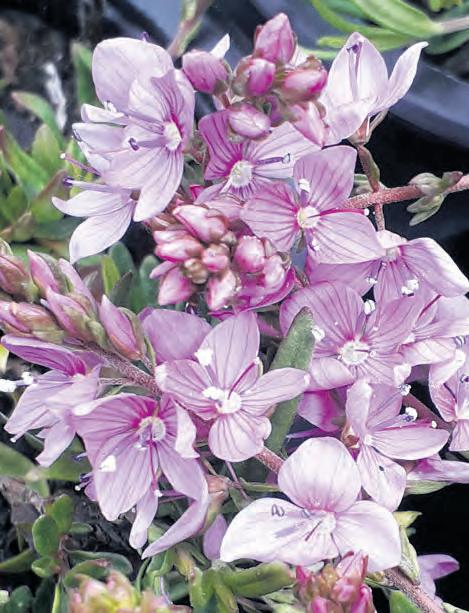

A small independent nursery based in Dorset growing garden worthy alpines & perennial plants. Mail order & plant fairs only.
www.leesasalpines.co.uk
leesasalpines20@gmail.com
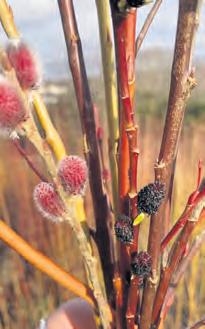

Really Useful Plants cultivates over 30 willow varieties

Really Useful Plants at Easterhill Nursery in Starcross, Devon, specialises in growing useful plants –herb plants for wellbeing, food and medicine; pollen rich perennials, and native wildflowers for creating wildlife and herb gardens; perennial vegetables and forest garden plants to promote good soil health and encourage balance with nature in gardens.
They are specialist willow growers, cultivating over 30 varieties of useful willow for ornamental and wildlife value, living structures, basketry and craft. Colourful, ornamental willows make great statement shrubs for year-round interest in gardens. Slender varieties are good for basketry and are used in workshops that take place at the nursery. More robust varieties are excellent for creating willow structures and living fences with commissions and advice offered.
www.reallyusefulplants.co.uk
Koirin, Rhododendron and Azalea Centre specialise in rare and unusual varieties including old varieties from family collectors such as waterer and The Rothschild family of Exbury. At the nursery they produce their own plants from their own cuttings. They have over 800 varieties of plants including many scented varieties of deciduous azaleas and rhododendrons. They have been established for over 20 years and the nursery is three acres in all and in the spring is an abundance of colour from hot fiery reds, orange and yellows to all the pastel colours you can think of. They also supply a planting service and watering systems and free advice. The nursery is worth a visit.
Email: enquiries@azaleacentre.co.uk
Tel: 01202 824629
Koirin, the Rhododendron & Azalea Centre Woodlands, Verwood Road, Nr.Verwood, Wimborne BH21 8LN
Old Court Nurseries and The Picton Garden is located at the foot of the Malvern Hills, a compact site offering a wealth of special and unusual plants. In the one and a half acre garden you can explore a huge variety of plants with areas ranging from herbaceous borders to woodland glades. Being home to both the National Plant Collection of polypodiums and the National Plant Collection of autumn flowering asters (Michaelmas Daisies) gives you an idea of the range there is to see. The adjoining nursery is well stocked with many unusual varieties from tender succulents to the tough asters and all sorts in between, and all grown peat free. www.autumnasters.co.uk 01684 540416
Old Court Nurseries Walwyn Rd, Malvern WR13 6QE

We offer special all counties prices when advertising with our features, plus 100 words of free editorial with an advert. Speak to one of our sales people for more details.

Beautiful Orchids!
The widest range of orchids in the UK with a fantastic choice in flower all year round.
Browse 1000s of plants in our nursery and shop, expert advice always on hand.


Freshly made salads, sandwiches, toasties etc.
Barista coffee. Spacious indoor and outdoor seating.
Open Monday - Friday 10am - 3pm plus one weekend each month, please contact us for the dates.
Forches Cross, Newton Abbot, Devon, TQ12 6PZ 01626 352233
@burnhamorchids
www.orchids.uk.com
Leesa’s Alpines is a small independent nursery based in Dorset growing garden worthy alpines and perennial plants which can be purchased via mail order and plant fairs only.

All the plants are grown in a reduced peat compost in a polytunnel initially but moved outside as early as possible to ensure their hardiness. Alpines (or rockery plants) are hardy perennial plants suitable for many situations in the garden. Although ideal for traditional rockeries and crevice gardens they can also be used for containers, stone troughs and sinks as well as pots, with many species being used to edge borders and pathways as they benefit from well drained soils, many being extremely drought tolerant.
You will be able to see Leesa’s Alpines out and about exhibiting this April and May:
• Burrow Farm, Axminster Easter Sunday
• Forde Abbey, Chard 6th April
• Mapperton House, Dorchester 14th April
• Moreton Gardens 20th April
• BBC Gardeners World Beaulieu 3rd-5th May
• Yarlington house, Wincanton 11th May
• Athelhampton House, Puddletown 12th May
• Sculpture by the Lakes, Dorchester 17th and 18th May
www.leesasalpines.co.uk for other dates
leesasalpines20@gmail.com
Rosybee is an independent plant nursery specialising in plants for pollinators, aiming to make gardens more wildlife-friendly. Their range is based on many years of research to ensure they provide plants that maximise the pollinator food supply. The research and plenty more tips on wildlife gardening can be found on their website. Great value plants in trays of six. All plants are grown peat-free and pesticide-free and in recycled plastic trays.
www.rosybee.com




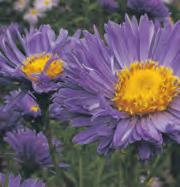






If you have any queries, questions or gardening problems then let us know and we will try and help. Contact us at Country Gardener, Mount House, Halse, Taunton Somerset TA4 3AD or at editorial@ countrygardener.co.uk
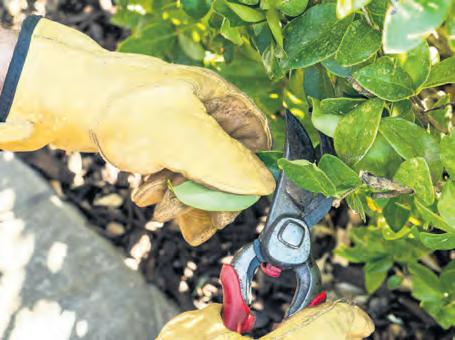
I’ve an evergreen hedge which has been neglected quite badly over the past five years. We’ve been looking at it this winter and wondering if we should just replace it. It is about 25 metres along the end of our garden backing on to open fields.
Jimmy Slater
Bridgwater
You should try renovating because no matter how bad you think the hedge has become, it will be worth it and it will recover. The key trick is not to try and do all the pruning at once. Spread the work over two or three years so the hedge will retain its value for wildlife and giving privacy for your garden at the same time. And it is certainly cheaper than planting a new hedge from scratch. Privet, yew and laurel all regrow well after hard pruning and it will look fine after a couple of years.
Start by cutting one side of the hedge back by at least 15cms less than the final width you want. Cut almost to the main stems if necessary.
Do check for nesting birds because remember it is an offence under the 1981 Countryside Act to intentionally take damage or destroy the nest of any wild bird while it is in use or being built.

I have always been a lover of flowering cherries and now we have a new garden I’d like to make a feature of a couple of medium to large trees. I want some traditional colours but perhaps something white. Do you have any suggestions?
Renee Davies
Weston
There’s quite a choice in front of you. In total there are around 30 species and more than 600 hybrids and named cultivars available. Amongst these you can find individual trees which will be in flower from every month from October to the end of May. The vast majority bloom in late March through to May. They are exquisite garden plants and very useful in a planting scheme thanks to the range of flower types. Two very popular hybrids are:

• P. ‘Tai-haku’ a medium to large tree with large single, white flowers and bronze young foliage. Known as ’the great white cherry’ and it comes with a fascinating history.
• P. ‘The Bride’ a smaller elegant tree with profuse early season, white single flowers, yellow and orange autumn colour and ideal for a smaller garden. Loved by bees.

I have a much-loved acer in my front garden which is now being overrun by shrubs and plants around it. I think I must move it. We are now coming into March and I wondered what is the best time for me to move it?
David Binney Taunton
I have through the years tried growing sweetcorn but although the plants seem to flourish and grow well the final cobs never seem to come to much and never ripen. I’d like to try again but I am conscious I have to do something differently.
Peter Greenway Petersfield
Good pollination might be a problem. Grow the sweetcorn in blocks rather than long rows around 40cms apart to help the pollen disperse more effectively between plants. This is important as sweetcorn is wind pollinated. A minimum of 12 plants will ensure good pollination and cob development. You should tap or shake the plants occasionally when you notice pollen falling from the tassels to help disperse it. Don’t over water, the plants only need watering when young and too much water can harm the final cobs.
There is a white substance which has appeared in early March on my otherwise very healthy and strong growing box hedge. Can I afford to leave it or should I be treating it?
Ian Weller Salisbury
This white substance comes from an insect known as box sucker (Psylla buxi). It is unique to the box plant but rarely seems to cause a great deal of damage. The aphids suck sap from the sheet tips in spring, stunting them so the leaves are cupped together to form a cabbage like shape. They create a sugary substance which you can see on the plant although in your case it seems very early in the season. You don’t need to do anything as the box sucker can usually be tolerated.
Acers can be very fussy about being moved. You should do it before the real growth of spring sets in while it is still reasonably dormant, digging up as much of the rootball as you can. Make sure the new site is well prepared for a swift replant because this will help the roots from drying out. You will probably have to stake the tree. It will need watering for a couple of years while the roots re-establish themselves so check the roots down to at least 15cms . If it feels dry keep on with the watering regime.
I have a number of vertical lesions on the trunk s of my three cherry trees. In one of them the inner wood is clearly visible. Is the tree dying and do I need to replace them?
Fran Morris Portsmouth
Don’t rush to do anything drastic, Many fruit trees are susceptible to bark splitting. This can occur in response to environmental factors such as dry weather which slows growth, followed by wet weather which encourages growth- a combination which leads to splitting. Support the trees by mulching generously and watering well in dry periods. While this will help it clearly won’t heal the wounds making it vulnerable to rot and disease. Give the trees at least one season to see if things don’t get worse.
Can you hand pollinate a pear tree? My two trees are struggling and I think pollination might be the problem. And can a pear tree be pollinated by apple?
Andie Frenchman Dawlish
Your best bet is to find a blooming pear somewhere else, and with permission, cut some branches with flowers and put them in water. Set them in or near your tree so bees can find them. Or take pollen off the new pear flowers and pollinate your tree by hand.
Choosing two different cultivars as partners greatly increases the chances of pollination and, therefore, fruit set. As long as a partner pear tree is not further than 100 feet (30.5 m.) from your tree, you can still get plenty of fruit.
Bear in mind that apples pollinate apples, but not other fruit trees species e.g. pears. The same goes for plums. So, if there are no other fruit trees anywhere nearby, successful pollination needs two or more varieties of the same species.


What is the best month to prune hydrangeas? My shrubs seem to be in rather a sad state and are quite overgrown and scruffy
Keith Harris Martock
The ideal pruning period is February or March in most of the UK. Some will say you shouldn’t prune until later in March. The dried hydrangea flower heads give the buds below some protection from very bad weather so the shrub has some protection in bad weather. Try to leave as much of the flowering growth as possible, as most flowers appear towards the top of the plant. If your plant is very old or overgrown, you can cut it back hard. However, this may reduce flowering for the next couple of years - aggressive pruning should be avoided as the flowers bloom on the previous years’ growth.
My amaryllis bulbs haven’t flowered this spring. I watered them over winter and they seem to have some very thin leaves this year.
Oona Davis Southampton

This is a standard problem with amaryllis. Your plant needs to have a dormant period to come into flower again. Once the risk of frost has passed move it to a sheltered place outdoors for summer, shaded from direct sunlight. Water and feed regularly with a balanced liquid feed. In late September move it to a place at around ten to 13 degrees for two months, stop feeding and watering it. After the summer rest period cut away any dead leaves and pot then plant into new compost. Bring it finally into a warm, bright room and water sparingly until growth resumes and the flowers should appear again.
I have some old roses in my garden and some of them look past their best, but I want to give them a chance and feed them properly this spring. What is the best thing to give them. Do Epsom salts help?
Frank Skeates Bournemouth
Firstly, the best time to feed roses is from late March to early April and then again from late June to early July. To add to this, you can feed them every six weeks throughout the growing season. Ideally use a good feed with something like fish, blood, and bone, or Vitax Q4 that contains all essential trace elements and nutrients after the late-winter prune in February, then feeding every two weeks throughout the flowering period with a high potash feed.
Epsom salts can help prevent magnesium deficiency in roses, resulting in healthier foliage and what’s more, additional magnesium supply may produce more blooms, larger flowers, and support the formation of strong stems.
How can I guarantee no tomato blight which I have suffered for each of the three last seasons. If I can’t understand what is happening it really isn’t worth me bothering.
Ian Davies PooleNo gardener can guarantee no blight. The first step is of course to grow blight resistant varieties. It’s not a 100 per cent deal but will certainly help. If the worst happens and you do find signs of blight on some of your plants, then the best tomato blight treatment is to remove the infected plants immediately. Check tomato plants regularly during the growing season, especially when the conditions are warm and wet.. Slow the spread of the disease by pruning tomato foliage to improve air flow. Thin the whole plant by removing one-third or so of the foliage. Fruit production will likely be reduced with extensive pruning.

How and when can I prune my magnolia tree which has again been wonderful spectacle over the past few years and is a real talking point in the whole neighbourhood?
Jody Holden ExeterDeciduous varieties should be pruned in late summer, evergreen varieties should be pruned in spring, and wall-trained specimens should be pruned in summer after they have finished flowering. Many magnolia varieties bleed when cut, so it’s important to prune at the correct time of year to avoid this.
In late autumn or early winter, the magnolia tree will begin to prepare for dormancy. This is when the tree’s leaves will start to turn yellow and fall off. Once all the leaves have fallen then the tree will be dormant until spring.
You will need to cut the branches at a quarter of an inch from the side. Remove suckers and water sprouts. These hold back your tree from growing up to its full potential.
Do you cut raspberries down every year or can they be left as the jobs mount up?
Anna Duggal HavantCutting back raspberries to a set system is vital if you want a good harvest. Simply cut the canes to the ground each year in the late autumn or early spring when they are dormant.. New canes will emerge from the ground in the spring.
Once you’ve harvested the berries later in the year, all the stems that bore fruit should be removed. Cut all the old wood to the ground – it’ll be dark brown – leaving the new green shoots to develop and fruit the following year. Removing the old wood encourages healthy new shoots to grow from the base, reinvigorating the plant.
Spring is finally here – that means all the thinking and planning of the winter months is behind us. It’s time for the garden itself and with it all the challenges that April brings– often hard physical work in the garden, in borders and vegetable beds, planting for the summer, tidying and ensuring borders and making sure we have the right product for the right jobs For many gardeners it the most popular month of the year – and one of the busiest. So, a few garden accessories can come in handy.
It is important to get some help. There are so many products lined up now to take off the hard physical work in the garden that most of us would be crazy not to seek help.
At Country Gardener we are always on the look out for great products and fresh ideas so here’s a few to help take the strain and make the garden even more enjoyable.









Crafted from the dust and fibres of coconut husks, our 50L Coir Vital Grow is a high quality, peat-free and sustainable growing medium for all types of plants and crops.


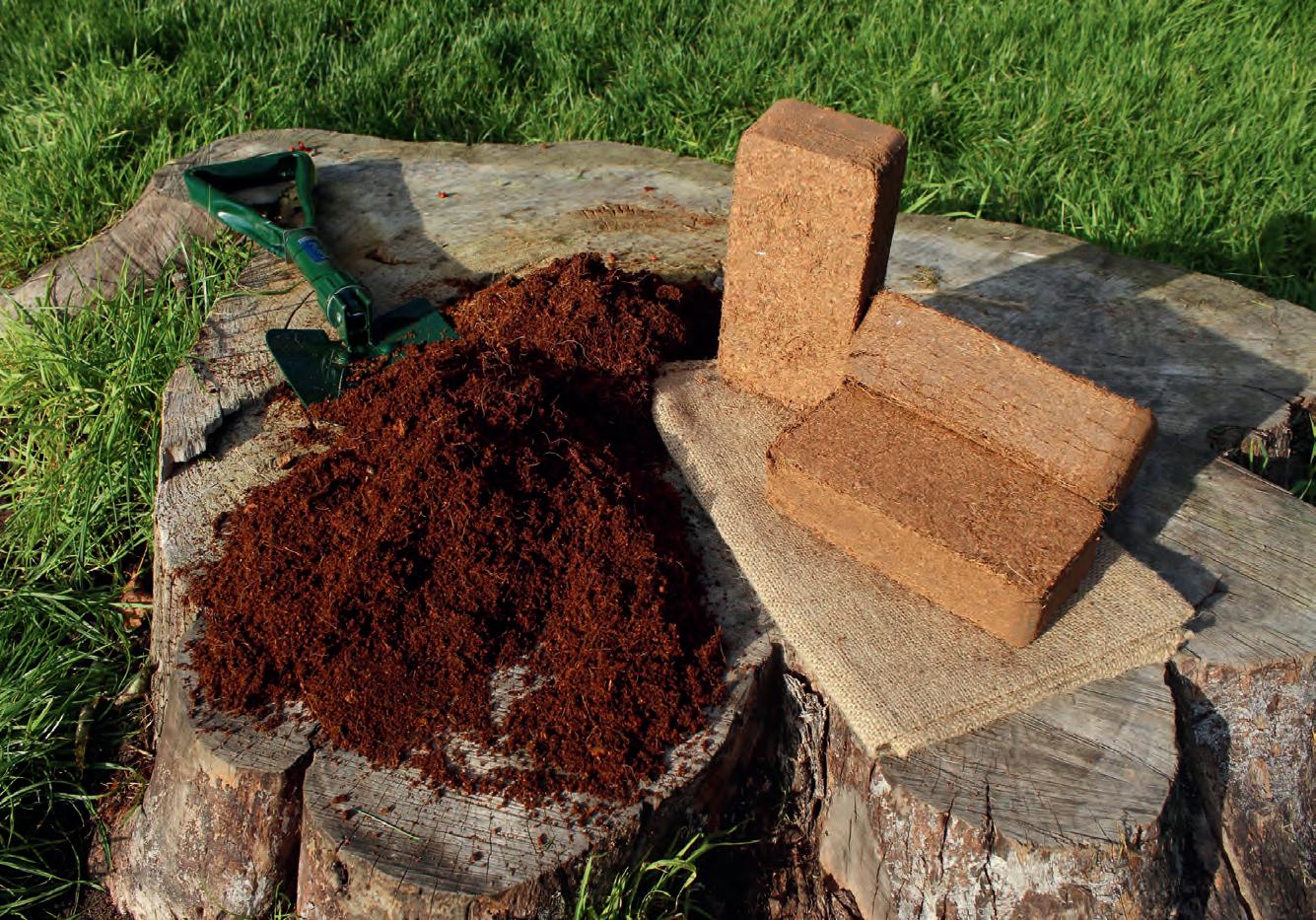


Enriched with NPK, our high quality 50L Coir Plus is a peat-free growth substrate providing your plants essential elements for healthy and robust growth.
A revolutionary, specially-formulated mix, our peat-free 50L Coir Nutri blends age-old traditions with the inherent goodness of coir, giving plants the extra boost they need for optimal thriving.

HARNESSING THE POWER OF COIR WITH OUR REVOLUTIONARY 50L COIR BAGS.

The ergonomic and functional OneLeg stool, enables you to sit rather than kneel, when completing low-level tasks around the home and garden.
With a rounded base, you can naturally rock and tilt as you sit, increasing your reach as you tilt forward, improving your core and saving you from kneeling or bending which can cause pain to the lower back and knees when gardening or cleaning. Weather proof, impact resistant, lightweight, easy to clean and 100 per-cent recyclable, the stool comes in a great choice of colours and two heights, with a free black silicone anti-slip foot. You can add a seat cover for extra comfort.
Once you have one you may wonder how you ever lived without a OneLeg.
Tel: 0800 195 4252 Email: oneleginfo@oneleg.co.uk www.oneleg.co.uk
Crafted with care and attention to detail, CoirProducts coir bird nests provide a luxurious sanctuary for birds, blending seamlessly into any landscape. CoirProducts coir bird nests are handcrafted from discarded coconut shells, providing a natural and cozy sanctuary for birds. Completely biodegradable, the bird nests are a blend of beauty and eco-consciousness. With their natural insulation properties, these nests maintain optimal temperatures year-round. Not only is it a functional bird nest, but it also serves as an aesthetic addition to any garden or balcony. The coconut shell design adds a touch of rustic charm to any outdoor space. The organic shape and texture mimic the feel of their natural habitats, ensuring a stress-free environment for nesting and resting. ww.coirproducts.co.uk

‘In adversity I turned to nature’


One of the biggest problems with a fastgrowing garden in spring and early summer is the support so many plants and shrubs need. You can control your shrubs & climbers using Rivelin Glen Products uniquely designed Wire Anchors. They are quick and easy to attach to concrete posts (without drilling) to act as an ‘eye’ by threading wire through them to create a trellising system.
The Gripple Trellising System is ideal to use with the Wire Anchors as the wire does not stretch, takes up to 100kg load and has a life of up to 15 years. Multiple rows can be achieved with one length of wire and two tensioners. No more sore hands or sagging wires!
Rivelin Glen Products are the main stockists of the Gripple Trellising System.
Prices: Wire Anchors from £10 for a pack of three; Gripple Starter Kit - £19.75
Details available at www.rivelinglenproducts.com
Email: info@rivelinglenproducts.co.uk
Tel: 01246 462666

When west country banker Alex Chapman was involved in a serious car crash he eventually found gardening was the route to dealing with the trauma and learning to relax
My route into gardening was through a serious crash in 2017 - a pivotal event in my life. What was a normal Saturday evening out ended in tragedy with my best friend killed and me injured with a damaged spine and a broken arm. Physiologically I was in a mess, let alone physically.
I had no ability to concentrate, no desire to meet people or interact with anyone as part of my route back to something like my old life.
Hundreds of people must feel like this after an accident or an illness. All my effort such as it was, I guess was put into recovering physically but there were other perhaps deeper scars which left me depressed and wondering what life offered.
As I slowly recovered and the weeks went past, friends and family urged me to fill my time with something.
They suggested painting and artwork but that had no interest for me.
Then I stumbled on a derelict, neglected unloved space and it unlocked my mind.
It was a small area of garden where I had lived for two years but had been so busy with career and travelling that it had remained neglected – and truth be told I had barely noticed it other than perhaps on a sunny summer afternoon sticking a deckchair out in it and sitting and reading.
It was less than half an acre.
I appreciate there is a lot about my story which is perhaps a bit of a cliché but gardening became with the help and advice of a group of friends a way of dealing with trauma.
I had to start at the beginning – clearing two year’s worth of weeds and rubble and working harder physically than I ever had done in my life. Then I needed help – what to plant. how to plant it, how to tend for it.
“What I learned is that you don’t have to know everything to get involved. You don’t become a gardener, you are already a gardener - you just need to activate it”
Gardening saved me at a time I was feeling low, and I liked to think it helped others around me as well. I was getting a lot off my shoulders, just by speaking with other people and learning about gardening, being in the fresh air and when often the biggest thing I had to worry about was whether the tomato plants needed watering again!
Looking back, I was bottling everything up and the garden became a good way to open up and break down barriers and relax.
It’s not a therapy session, no one is questioning you and it felt and still feels very natural.
What I learned is that to you don’t have to know everything to get involved. You don’t become a gardener, you are already a gardener- you just need to activate it.
At first it was almost as if I was embarrassed to be in a garden - now you still can’t shut me up about it.
I’ve given talks to hospital groups and tried to share my experience. I think the work in the garden played a huge part in my recovery. I now work for a charity and I have put all the big career hopes behind me – without any bitterness at all. My garden will never win acclaim from fellow gardeners. I don’t feel as it is too scruffy, but it is busy and things grow. I grow vegetables and fruit, and it remains an escape and I love it.
I don’t know where I would be without it.

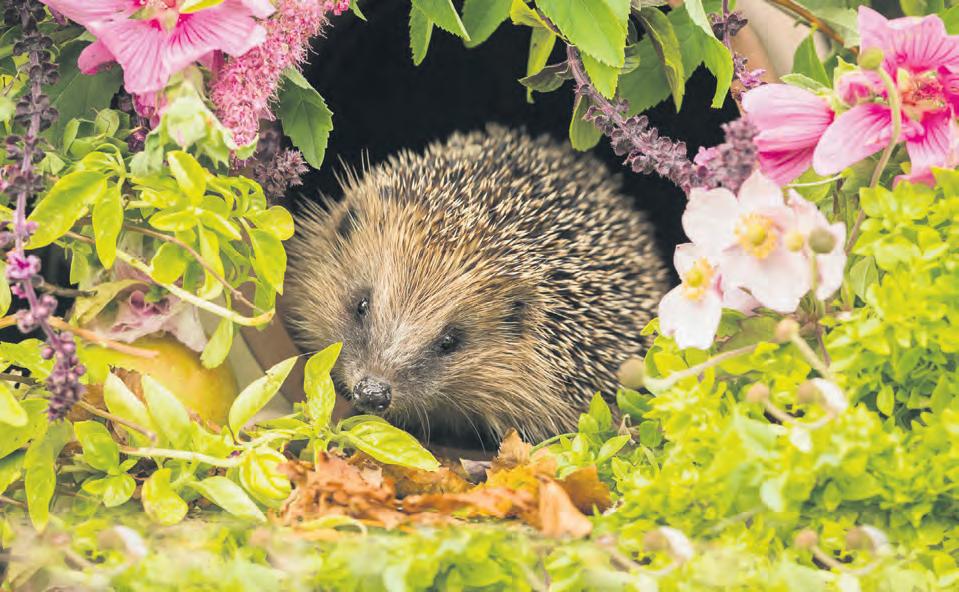
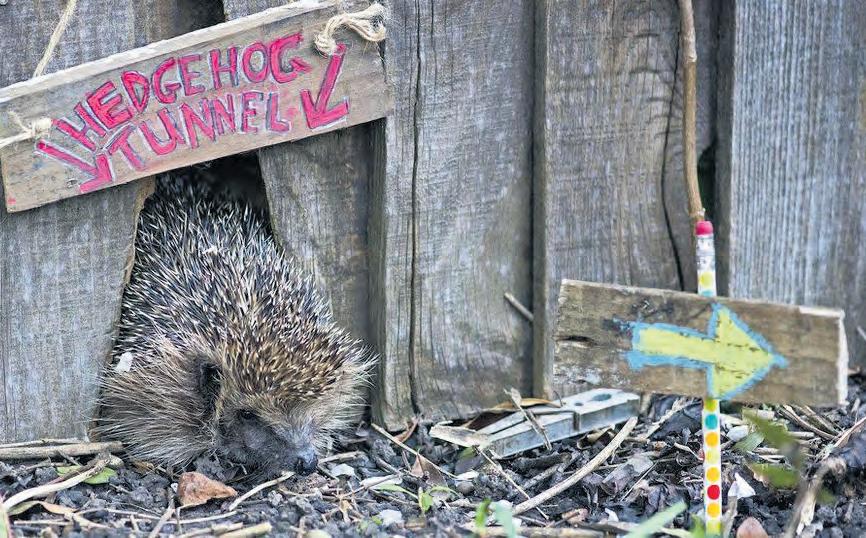
Hedgehogs are one of Britain’s favourite familiar faces found in our gardens. Spring will bring their fresh appearance and with it the demands of caring gardeners to again do whatever they can to aid their survival.
Although these adorable little creatures seem to be everywhere, due to a decline in rural habitats almost one third of the national hedgehog population has been lost since the 2000’s.
That’s why it’s reasonable to suggest do everything we can to protect the hedgehogs, and one way we can do that is by turning our gardens into a hedgehogs’ favourite spaces to be. It’s not complicated but some fairly basic rules need following.
So, as we s move into spring, wildlife experts and lovers have put together a guide on how to prepare your garden for the best time of year, hedgehog season.
Hedgehog season (or mating season) is the most crucial time for hedgehogs. It begins in April, and can last all the way to September, although peak breeding months are in May and June.
Usually, a female will have up to seven hoglets, who will nest all together in a layer of leaves and grass, until the hoglets leave the nest four to five weeks after being born. Throughout this season and especially up until this point, try to keep leafy and unkept areas of your garden as undisturbed as possible.
April onwards is the time of year when you are most likely to actually see hedgehogs in your garden. Though they are nocturnal creatures, nights are so short in the summer months and hedgehogs have so much to do, that it’s not unusual to spot a healthy hedgehog out and about in the daylight.
The first step to creating a hedgehog-friendly garden this spring is to embrace the open road by creating a hedgehog highway. They are nomadic creatures and can roam up to two miles every night. However, one reason their numbers are declining is due to the reduction in access they have to land. By creating a hedgehog highway, or a small gap in your fencing to allow them to pass through, your hedgehog can roam far and wide. This
gap should be around 13 square centimetres, perfect for hedgehogs, but not for the larger mammals you want to keep out!
Despite their innocent faces, hedgehogs are carnivorous animals and roam at night in the search for small insects such as beetles, worms, slugs, earwigs, and millipedes. Sometimes they’ll even eat baby birds, frogs, snakes, bird’s eggs - and for dessert - garden fruit.
The best way to bring insects into your garden is by keeping your garden healthy and bio-diverse through letting parts of it grow wild. To do this you can:
• Start by growing insect friendly plants and wildflowers such as foxgloves, and hawthorn.
• Avoid cutting the grass, and keep parts of your garden unkept and wild in patches.
• Create a compost heap to create the perfect environment for worms, slugs, millipedes, and beetles.
• Start a bug hotel to attract a diverse amount of bugs into your garden.
Before the start of the season, do the rounds and rid your garden of any potential hedgehog hazards. Check for the following potential hazards which you can tick off your list one by one:
• Avoid man-made dangers or anything a hedgehog could get trapped in or fall into.
• Don’t use any pesticides.
• Don’t put down any slug pellets.
• Although hedgehogs are keen swimmers, hedgehogproof garden ponds and swimming pools by fencing them off, or creating sloping sides so that they can easily get in and out.
• Clear your garden of any nets, traps, and toys.

Planting hedges can be a great alternative to fencing. Not only do they provide more shade, absorb noise and dust, they also provide better shelter to all forms of garden wildlife. They can promote better soil, attract insects, and usually allow for leaves to gather at their sides which provide a great nestling spot.
Another great way to provide a cosy home for these animals is to place a wooden hedgehog house in the garden. They provide safe, robust, and secure shelter where they can hunker down for winter or get ready for mating season.
Once you have prepared your garden for hedgehog season, remember a little bit of maintenance goes a long way. Keep pruning and gardening to a minimum, and keep the lawnmower and strimmer locked away in the garden shed. Try to disturb them as little as possible by doing your bit to keep nature thriving.
To give a helping hand here and there, you can put out small bowls of water for easy drinking access and small portions of meaty cat or dog food in the evening to make sure they’re well fed and hydrated. Better yet, set up a wooden hedgehog feeding station which keeps the food safe and hidden from other animals - perfect for a night in and meal for one!



www.gardenplantsonline.co.uk
0203 137 5159

A wide range of plants & trees available for UK-wide delivery direct to your door
Discounts available for trade customers
Add spring bright colours to your garden! Acacia Dealbata (Mimosa Tree) - available for delivery from as little as £51.95 product code: 22728
Scan to browse the website!


BEFORE

AFTER
www.patioblackspotremoval.com
Completely restore the natural colour to patios and paths of any age, in less than two hours*.
Patio Black Spot Remover® works on all types of stone providing stunning, long lasting results.
Go Ferrous, the solution to remove those orange spots caused by lawn fertilisers and rust stains from BBQ equipment, metal pots and plants, without damaging the stone or surrounding plants.
Whether buying the product or using our service, prepare to be amazed!
Book now for Summer!

More Restoration
Less Perspiration!
Order online today or call: 0800 500 3032
Use code COUNTRY at checkout for 10% Discount
(*product activation time)
www.countrygardener.co.uk


Weather historian and lover of folklore Andrew Lancaster looks at what April is likely to offer in terms of our garden and the weather. Andrew gardens a two-acre site in Somerset and he plots a way through the signs in the weather which can make gardening easier.
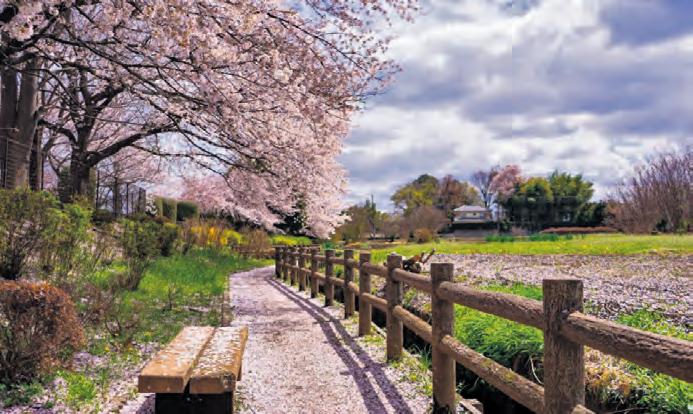
I like the analogy of our weather in April being compared with an adolescent teenager. At one moment brilliant and promising, the next moody, cantankerous and unpredictable. There is so much energy and hope around yet it is often that the month stops us in our tracks with not only prolonged rain but worryingly low temperatures.
It’s not I think a coincident that the month starts with April Fool’s Day as the whole month can take us for fools and catch us unawares. But these days I like to take a positive approach. I am ready to be proved wrong but for me the arrival of April means that winter is done and dusted, put behind us.
Shoots are pushing up from the ground, the trees are in bud and call me a romantic but the air smells different now, the scent of growth and renewal is a head brew that lifts the spirits after the long winter weeks.
April can be surprisingly dry and affect the flowering of spring bulbs the following year. The real treachery of the month comes from late frosts which strike when apple and pear blossom is in full cry for then the chilled air can blacken the centre of each flower and prevent the fruit from setting.
For centuries, farmers and sailors—people whose livelihoods depended on the weather— relied on lore to forecast the weather. They quickly connected changes in nature with rhythms or patterns of the weather. Which is why I still put a lot of store on some of these sayings
• Moist April, clear June.
• Cloudy April, dewy May.
• Snow in April is manure.
Weather watchers always take note on the weather at Easter. A bad year is forecast by poor weather on Palm Sunday but rain on Good Friday is believed to foreshadow a fertile year easter being a moveable feast means the weather can vary from snow to warm sunshine. If there is fair weather from Easter to Whitsun butter will be cheap (that is the cows will produce plenty of milk.) A good rain on Easter Day means a good crop of grass but little hay.
April is known for some pretty bad rainfall, often heavy downpours.
It was in 1653 that the expression: “It shall raine…dogs and polecats” was first recorded but there has never been any acceptable explanation where this comes from. One theory is that it relates to the fact that in Norse weather the cat was supposed to have great influence on the weather and ‘have a gale of wind in her tail’.
More likely is that cats and dogs were drowned in poorly drained medieval streets during severe storms.
A rhyme long used in the spring to predict what the weather might hold in the summer is ‘Oak before ash, only a splash, ash before oak, soak, soak, soak,’ suggesting that the weather for the coming summer will be drier if oak comes into leaf first
It is all about which of these two trees come into leaf first. Britain’s Woodland Trust using records going back to the 18th century bears out the dubious nature of this prediction. Even though the ash bears its delicate sprays of tufted flowers before the leaves of either tree emerge, it is rarely in leaf before the oak. However, we all known that British summers
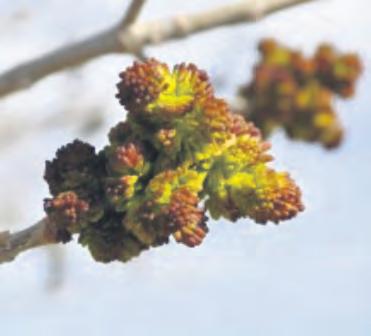

are becoming hotter and drier so it may be a bit early to write off the saying just yet. The English oak (Quercus robur) can live in. extreme cases for 5000 years. The ash (Fraxinus excelsior) which is easy to recognise in winter from its black buds and silver grey bark is often called the Queen of the Forest.
1st April
‘If it thunders of April Fools day it brings good crops of corn and hay.’ This old saying might in fact have something about it as thunderstorms only occur when warm air rises from heated ground forming highly charged clouds which produce the rain and thunder. Ground that is warm enough for thunderstorms at the beginning of April, suggests an early spring and a good growing season.
14th April
National Gardening Day – a day to celebrate all things that grow and encourage others to do the same.
23rd April
Sayings about St George’s Day on the 23rd claim it is the day when green growth starts. In European tradition there’s a saying that ‘ George is the keeper of the keys to summer and is asked to make the grass grow and disperse the clouds’.
23rd April
Start of the English asparagus season which ends on June 21st with the Summer Solstice.

April sees the start of the asparagus season and the weather is a key factor in the quality and timing of the harvesting of the spears. Asparagus is a hardy perennial that will last for 15 years or more in the garden. And, it’s one of the first crops harvested in the spring. Asparagus is generally considered a temperate/cold climate plant but it is easy to grow in a subtropical climate as it thrives on the rain and has no problems with pests or diseases. Asparagus crowns make a worthy addition in any vegetable garden. You need to choose a fertile, sunny well drained site with soil that holds its moisture well. Late spring frosts can kill emerged spears, so find an area that is not low-lying or exposed to frost. Asparagus plants have deep root systems. Avoid areas with shallow soils, or soils prone to watersaturation.
Will it be the ash (left) or the oak which appears first to help predict the summer ahead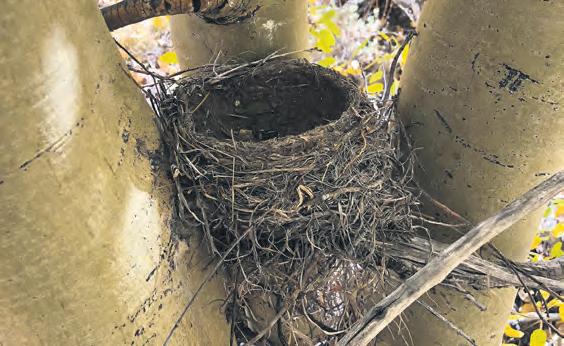
Many bumblebees and birds will be establishing nests and plenty of other species, such as moths, leaf miners and other insects, are already breeding. Hedgehogs, which typically emerge from hibernation in March, will be fattening up to be in good condition for breeding in May.
This is a month of frenzied activity - non more so than for bees where there’s lots of effort and work going into making nests in anything or everything that’s available: last years plants, airbricks, holes in dead wood. The warmer feel to the days encourages the female to make a series of chambers in the nest each with a ‘cake’ of pollen and nectar and lays an egg in each one before sealing it up. After laying up to 40 eggs she dies, never having seen her offspring.
April sees many garden birds ready with their nests. Each lays one egg a day , typically at dawn while the male sings nearby to defend the territory. It’s also a very noisy month specially on sunny clear April mornings when blackbirds, tits , song thrushes and wrens all come together at dawn.
April is still a month when wildlife needs your help.
Avoid cutting hedges between from March onwards, so as not to disturb any nesting species. Wild bird nests are protected by law under the Wildlife and Countryside Acts of 1981, although this tends not to apply to garden hedges
Offer high-protein bird food sources to support breeding species, such as sunflower seeds, mealworms and calciworms.
There is still the chance of a frost in April. Break ice on bird baths and water bowls if needed and refresh the water supply daily.

If I look at records I keep (and they only go back to 2001) then the gardener should expect ten days when there’s a frost in April. The Met Office who have records going back to 1960 say that it’s slightly more and that we should expect 12 days of below freezing. That sounds a lot doesn’t it and of course it’s difficult to be precise when you consider which part of the country your garden is and how sheltered your garden is. When high pressure dominates as it often does in April that can lead to clear skies overnight and this allows temperatures to fall below zero and brings frosty nights.
We have also seen the winds often coming in from the north which brings in colder air and overnight this can lead to cold and frosty nights. So I guess the answer is stay alert in April and don’t expect we’ve seen the end of damaging frosts!
Our popular gardening themed crossword is compiled by Saranda which over the past year has become enormously popular with readers. The winning entry to be drawn by us will receive £100 of RHS gift tokens. Completed entries should be sent to Mount House, Halse, Taunton, Somerset TA4 3AD. Closing date is Friday 19th April. The winner of our March issue crossword was Nigel Eaton from Warminster.
ACROSS
1. Plant of the Convolvulus family whose roots yield a strong purgative (8)
5. Sometimes called butter fruit? (7, 5)
12. Alternative name of the herb coriander (8)
13. Genus of plants commonly known as birthwort or pipevine (12)
15. Family of plants named after Swiss naturalist Conrad Gessner (12)
16. Scottish word for a farmhouse with its outbuildings (8)
17. Confesses or admits guilt (4, 2)
18. Sudden, very heavy rainfall (10)
22. A small round soft fruit, typically red or black (6)
23. The month of buds in the French revolutionary calendar (8)
24. A large branch of a tree (4)
28. Jack-by-the-hedge or hedge-mustard (5, 5)
29. Totally or utterly (10)
30. Manihot esculenta, commonly called cassava (4)
31. Of more humble origin or social status (8)
33. A particular breed or variety of an animal or plant (6)
36. A genus of timber trees native to Australasia (10)
37. Large greyish-green lizard of tropical America (6)
40. The family of flowering plants commonly known as rue (8)
41. An easy or defenceless target? (1, 7, 4)
43. Any flower of the Iridaceous genus (6, 2, 4)
44. Spore-bearing gills of a mushroom (8)
45. Something totally believed without having been checked (5, 2, 5)
46. A name for various kinds of apple, mostly of French origin (8)
DOWN
1. A feudal tenure of land involving paying rent to a superior (6)
2. Reddened or ruddy (6)
3. Cultivated root vegetable sometimes called field beet (12)
4. Daffodils or jonquils (8)
6. Genus of flowering plants whose common name is mullein (9)
7. The price of Bible leaf without Mary! (4)
8. General feeling of pessimism or hopelessness (4, 3, 5)
9. New Zealand genus of plants sometimes called flax lily (8)
10. Famous collection of poems by A. E. Housman (1, 10, 3)
11. The mycelium of a fungus, especially of cultivated mushrooms (5)
14. Grapes native to the southern United States (12)
19. Aristocratic or blue-blooded (2, 5, 5)
20. Irish dramatist (1880-1964) who wrote Oak Leaves and Lavender (6)
21. Name sometimes given to Quercus robur (11, 3)
25. Wild climbing hedgerow plant with red berries (6)
26. Botanical feature specialising in plants grown at high altitudes (6, 6)
27. Smooth grassy area at the end of a golf fairway (7, 5)
32. Plants that may include cabbage, broccoli and turnips (9)
34. Appearing in a film or television programme (2, 6)
35. A substance extracted from plant roots (8)
38. A small nut, especially an achene (6)
39. The former currency of Equatorial Guinea (6)
40. Restoration or repair of machinery (5)
42. Botanically, another term for axillary (4)
Kenwith Castle offer gardens and gardening as part of the way of life keeping residents happy, healthy and active.
The joy of gardening is universal and has no age limit, which is why Kenwith Castle care home in Bideford has an expansive garden for the residents to continue pursuing their passion.
Getting outdoors has a host of benefits for our mental and physical health, so the residents enjoy planting bulbs and sowing seeds year-round. The activities team at Kenwith Castle organise a range of clubs and sessions to bring the residents together to share their love of gardening to keep them happy, healthy and active.
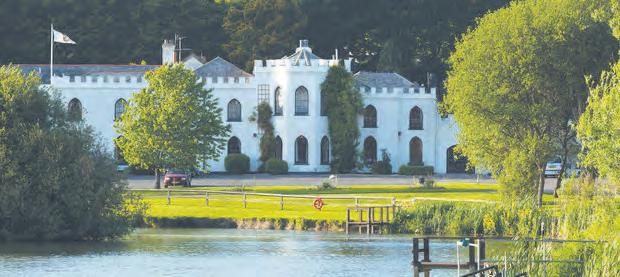
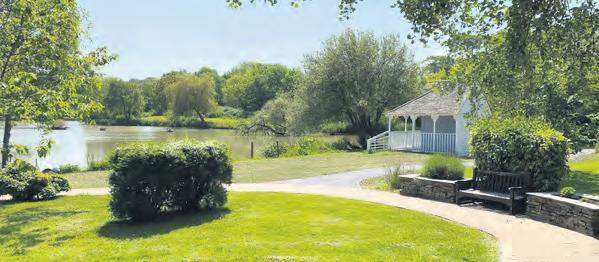


The residents have formed a gardening club where they get together to grow their own flowers, fruit and vegetables in colourful pots and planters. There is a team of gardeners who do all the general maintenance of the garden, meaning that the residents can spend their time doing the bits they enjoy, with none of the gardening chores, like weeding and cutting the grass, tied in.
Gardening has a host of mental and physical benefits for everyone but it’s particularly beneficial as we get older. These include:
• Gardening involves a manageable amount of exercise –walking around the garden, digging the soil and sowing seeds, and watering plants.
• Improved mobility – Engaging in gardening requires some bending, reaching and stretching which can help improve flexibility and mobility.
• Getting outdoors boosts Vitamin D levels helping to maintain healthy bones as well as being a great mood booster.
• Social opportunities to connect with family and friends while chatting over shared interests.
• Sense of accomplishment - The wonderful feeling of successfully growing plants, flowers, fruit and vegetables provides a huge boost to self-esteem and confidence.
The garden at Kenwith Castle has been designed to offer a sensory space for people living with dementia or sensory impairment. Scents from sweet peas, lavender and roses can stimulate memories, while touch can be stimulated through tree barks and grasses, and the residents can listen to host of noises from bees and birds who visit the garden.
The care home benefits from wider landscaped grounds featuring a picturesque lake with stunning countryside views offering a place for a moment of reflection.
The garden features wide, flat walkways and raised flower beds to make them accessible to everyone, with plenty of outdoor seating areas and benches to enjoy some quiet time. It’s also the perfect setting for the residents to enjoy a host of garden parties and barbecues to make the most of the sunnier weather, with friends and family always encouraged to join in the fun.
The grounds are also home to our assisted-living bungalows, Kenwith Castle Gardens and Kenwith Meadows, as well as Kenwith Pavilion Shop & Cafe, which opened towards the end of last year for the exclusive use of the residents within the care village. The shop is stocked with a host of everyday essentials, cards and gifts, while the cafe offers a meeting place for residents to get together over coffee and cake. It will also play host to a range of events including coffee mornings, afternoon teas, monthly Sunday roasts, quiz nights and games afternoons.
Kenwith Castle, which is part of the not-for-profit charity, Care South, provides specialist residential, respite, and dementia care. It features a dedicated activities team who organise a daily programme of events to bring residents together to socialise and build friendships.
The care home features individual rooms for residents which benefit from several large communal lounges overlooking the landscaped gardens and lake offering peace and tranquillity.
For more information about the care services available, go to care-south.co.uk or call Care South on 01202 712463.








Near to the magnificent River Exe estuary and the fringe of an area designated of outstanding natural beauty, the Cat and Fiddle Park is a short distance from the beautiful cathedral city, Exeter. With 1 park home available today starting at £185,000.
Glenholt is an established and sought after location approximately four miles north of Plymouth city centre. The area is largely flanked by woodlands that provide pleasant walks to Plymbridge. With 1 park home available today starting at £147,000.
This beautiful park is situated on the outskirts of Bovey Tracey, a typical small Devon town with good shopping facilities. The Park features mature woodland, large lake and views of the rolling hills of Dartmoor. With 1 park home available today starting at £262,000.
ANSWERS TO QUESTIONS SENT TO COUNTRY GARDENER ABOUT CARE FOR INDOOR PLANTS THROUGH SPRING AND BEYOND

What is the best place to put my houseplant?
Annie Worth, Petersfield
Except for cacti and succulents many foliage houseplants have evolved in rainforests where they enjoy shade and high humidity. So, grouping several plants together or standing them over a tray of moist gravel helps them to create a humid microclimate. Ideally choose a spot in the house out of direct sunlight which can scorch their leaves. They need bright light for good growth so an east facing window would be ideal.

I’ve moved into a new modern house and would like to brighten it up a bit with houseplants. But I am a beginner and would like some ideas please.
Tammy Lorde, Cirencester
Cacti and succulents are the obvious choice as are spider plants and snake plants, but they're quite boring and not at all exciting to care for. A better option would be to opt for a more interesting looking plant that's just as easy-going. Here are some thoughts about plants for beginners:
• Aegagropila linnaei (Marimo Moss Ball)
• Fittonia (Nerve Plant)
• Tradescantia (Spiderwort)
• Zamioculcas zamiifolia (ZZ Plant)
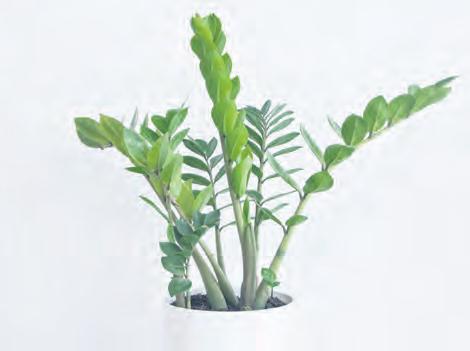
Can I water my houseplants with tap water? Mary Winchell, Minehead
Clean rainwater at room temperature is best for watering indoor plants. The water in hard water areas is alkaline which doesn’t suit plants that prefer slightly acidic compost such as orchids and Epiphyllum and it can contain fluoride which some plants are sensitive to, resulting in brown tips and edges to their leaves.
So it may be a quick fix but try to avoid tap water and keep some sort of supply of rainwater to hand. However, tap water is better than letting the plants dry out. Mains water attached to a water softening system should never be used as it is toxic to plants.
Do I need to feed and repot? I felt it was necessary to repot some of my beloved houseplants which looked as it they needed perking up after the winter. Now I have done that should I feed them too? Nicky French, Exeter
There should be enough fertiliser in fresh compost to last a couple of months after repotting so wait a while before you add any more fertiliser. Too much feed over a short period of time will do more harm than good and damage the plants roots and waste all your efforts to repot.
I think I have had it drilled into me that overwatering my houseplants will not do them any good but I suppose now I am not sure what the rules are about providing a proper watering regime? Karen Browne, Martock
The arrival of spring changes things a bit when it comes to watering. Plants are starting to grow so their whole system needs more attention. They are in fact much more needy during these weeks than in the winter. The best method of judging when a plant needs water is to monitor the moisture level of the compost every few days and only water when the top inch of compost has become dry to the touch. Watering to a routine such as weekly can lead to the plant becoming too dry or even worse a risk of overwatering. So, it’s not a question of regular watering times, it's being sensible as to the immediate feel of the compost.
My plant is drooping / has yellowing leaves and I don’t seem to be able to do much about it. Carrie Newton, Portsmouth
It could be the natural aging process. Plants will drop older leaves as they produce new ones, it's nothing to worry about.
If the older leaves are drooping or browning and new growth has slowed or stopped completely, it’s likely you’re over-watering. Other signs of overwatering are limp, soft leaves with poor growth and brown leaf tips. Check the soil, is it soggy or damp? Let it dry out and keep an eye on the plant. Signs of under-watering are limp and wilted leaves, little or no growth, flowers and older leaves die and fall off.
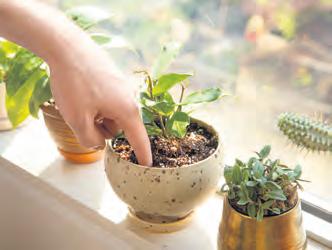

If you’re certain over-watering isn't the problem, it could be that the plant is in a spot that's too sunny or too dark. If the older leaves are growing in smaller or losing their variegation, the stems are elongated, and blooms are non-existent, your plant needs more light. If the leaves are brown or scorched, have a washed out appearance, and the plant looks shrivelled, the problem is too much light. Check the light and humidity requirements for your plant and find a better spot for it.
How do you prevent/deal with flies and fungus gnats which seem to be ever present on my plants? Louis Drake, Liss
You'll never prevent them completely but covering the top layer of soil with gravel helps prevent flies laying their eggs. Regularly raking the top level of the soil–perhaps once or twice a week–with a fork is effective. If you notice you have an infestation, fly traps containing apple cider vinegar and a drop or two of washing up liquid can help.
Tradescantia (Spiderwort) Zamioculcas zamiifolia (ZZ plant)

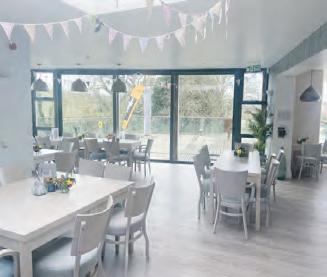



robotic mowers can be installed with or without boundary wires*. They are suitable for large and complex lawns and are equipped with the latest intelligent technologies such as object avoidance.






If you have anything you would like to share with our readers, ideas, views, moans or gardening ideas then write to us at Country Gardener, Mount House, Halse, Taunton TA4 3AD or email editorial@countrygardener.co.uk

I’ve been doing some research into the wonderful rosemary plant I have outside my back porch which seems to have been there forever and perhaps has been taken too much for granted. Our forebears ironically used to plant rosemary on their porches to ward off witchcraft and curses.
Legend has it that rosemary bushes originally had white flowers and that before Mary gave birth to Jesus, she is said to have placed her blue cloak on a rosemary bush. The flowers then turned blue and thereafter the plant was called 'Mary's rose'. Another piece of folklore says that a rosemary plant will never grow taller than Jesus Christ and if it out lives the 30 years it will grow prostrate instead of upright.
In ancient times it was believed to strengthen the memory; in literature and folklore it is an emblem of remembrance and fidelity. Rosemary is slightly stimulating. In traditional medicine it was a popular aromatic constituent of tonics and liniments. For my family and I it is a wonderfully useful plant which if kept under control and properly pruned is a great ingredient when cooking meat or stews and fills the winter kitchen with a sensational aroma.
Amamda Swift TorquayWhile on a walk in a local park in December I came across a fallen tree with many different types of fungi growing from its branches and trunk. Apart from being colourful and quite alarming looking, fungi do have several useful functions in the natural world, notably the breakdown of organic matter and nutrient cycling. I am not an expert, but I left well alone but enjoyed taking some photos that show their amazing beauty.
Hazel Dean Bridgwater
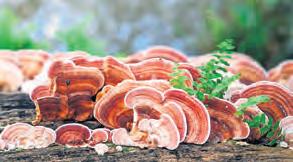
I enjoyed your article about folklore and March weather. My old aunt who managed to get to the age of 101 said she had a foolproof way of predicting the weather. It was all to do with ants. If they came out of their nest in straight lines or single file then you could expect stormy weather. If they were more random in their work, then the weather would be more settled. Perhaps odd but always memorable.
One of the most important nuggets of advice I was given when studying at Bicton College in Devon was the importance of keeping notebooks. I have since then always kept a diary or a notebook about my garden. They were rather scrappy things but then I discovered you could buy a five-year RHS gardening diary. It has columns for weekly comments of what’s been planted, what has grown successfully and what has died plus notes on garden visits, plant suppliers and so on.
I am now in my 21st year of recording and of a winter evening it's fascinating to look back on how my garden has changed and the work I have put into it.
Jacquie La Dell via email

I always trimmed my lavender plants to look neat in winter until one year we watched with amazement as a couple of bullfinches spend two weeks returning daily to eat the seeds. Since then, I no longer trim them until April. They produce just as good a crop of flowers but a bit later. There’s no need for this neat and tidy nonsense. Time is running out. If people want a neat winter look then trim your box hedge.
Beth Ransome NewburyI believe the secret in helping bees in gardens is to keep offering something new in the garden. I was dismayed when our large Mahonia x media ‘Charity’ which has been attracting bees for year and years failed to flower well last year and there was a big gap in our gardening offering. I then saw some bees feasting on our winter flowering honeysuckle which has been growing well from a cutting I planted just two years ago near the back door. I’ve learnt not to rely on old faithful’s but try and find new ideas to help bees and other pollinators.
Jackie Vaight Burnham
I want to sing the praise to your readers of something which I was introduced to a few years ago and now which I am proud to be able to grow in my Somerset gardenhardy slipper orchids which were once the preserve of experts but now more easily grown hybrids have opened them up for us less talented gardeners. Hardy slipper orchids have always been considered hard to grow but a group of gardeners specialising in orchid hybrids has changed things so this wonderful plant can now thrive in all our gardens.
It is an herbaceous perennial which needs a well-drained cool place in part shade and dry in winter. There are now 50 species. Our UK native Cypripedium calceolus was brought to the edge of extinction by collectors who plundered it. It is now becoming more available and is superlative plant which can now be found at the best garden centres, certainly on request. I would recommend it as a must for the serious gardener.
Success! I thought I should celebrate the fact that after a bit of a mini-campaign in our neighbourhood before Christmas we have just celebrated six weeks without sight of a single bonfire. I’m not sure if this is down to our letter box campaign asking people to stop or just people not being in their gardens very much but it has worked and long may it continue.
Mary Sanders HonitonI wonder how many of your readers have the courage to plant something crimson in their garden or borders. We now have quite a collection of the colour . Did you know it was chosen as Pantone’s Colour of the Year last year so I think we are ahead of the trend. Pantone launched its colour matching system over 50 years ago and I know garden designers are always keen to see what the new colour of the year is. We have three crimson delights in our Dorset garden - Dahlia ‘Western Pirate’ which is the most wonderful strong colour; Astrantia ‘Burgundy Manor’ and Acer palmatum ‘Astropurpureum’. Crimson is a colour which works beautifully with silvers and blues.
Connie Trantor Wellington
We offer an opportunity for you to nurture the next generation of gardening trainees

A WRAG (Work and Retrain as a Gardener) trainee will provide practical, enthusiastic help and can be a great asset to a busy garden or nursery. In return, you’ll pay the trainee the National Living Wage and be responsible for horticultural support and guidance for up to 2 days per week.
WRAGs is a unique scheme administered by the WFGA, designed for career changers and new gardeners wishing to gain practical experience.
For more information: admin@wfga.org.uk wfga.org.uk



Mushroom compost, ornamental bark and wood chip £3 small bag £85 dumpy bag
Compost, topsoil farmyard manure, horse manure, wood chip mulch and chicken manure £2.50 small bag £75 dumpy bag
Bulk orders can be mixed Example 1/3 topsoil 1/3 manure 1/3 compost Great for raised beds
Topsoil and compost is sieved or screened
CONTACT US TODAY
Heather: 07809 870230 | Nick: 07860 459745
The Farm: 01404 891684 | Evenings: 01884 841694
www.connettscompost.com | connettsfarm@outlook.com
Connetts Farm Connetts Farm
Delivery available at cost

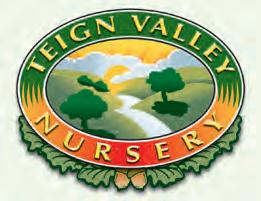



www.countrygardener.co.uk
ACCOMMODATION
Secluded cosy cabins & lodges in wooded valley running down to Wembury Bay & SW Coastal Path

Plymouth, Dartmoor & lovely South Devon Villages & Towns in easy reach. Pets Welcome. Forest School. Tel: 01752 862382
www.churchwoodvalley.com

NEAR WESTON-SUPER-MARE
HOLIDAY BUNGALOW SLEEPS 2
FROM £190 PW. NO PETS. PHONE FOR BROCHURE 01934 820351

Carmarthen Bay South Wales
Seafront chalet situated on estuary. Sleeps up to 6. Seaview. Well Behaved Dogs Welcome Free of Charge. Free WIFI. Open from 1st March - 31st Dec. For Brochure
Tel: 01269 862191
GLORIOUS NORTH DEVON. Only
9 cosy caravans on peaceful farm. Wonderful walks in woods & meadows. Easy reach sea, moors & lovely days out. £125-395pw. Discount couples. Nice pets welcome. 01769 540366 www.snapdown.co.uk
BOSWORLAS, ST JUST.
Cosy Cottage sleeps 2-4. Please email info@bosworlas.co.uk for availability
SOUTH DEVON LODGE on peaceful farm. Sleeps 4. Central for beaches, Salcombe and Dartmouth. Phone for details 01548 853669.
ACCOMMODATION HOLIDAY COTTAGES
WYE VALLEY/FOREST OF DEAN. Fully equipped single-storey cottage with two en-suite bedrooms. Wi-fi.Recently awarded Visit England 4-star GOLD. Rural retreat, shops/pubs one mile. Enquiries welcome. AS SEEN ON ESCAPE TO THE COUNTRY! Tel: 01594 833259 www.cowshedcottage.co.uk

HOLIDAY COTTAGE SIDMOUTH, DEVON
A quiet holiday bungalow near Sidmouth, overlooking the Donkey Sanctuary. Ideal for walkers and nature lovers. Sleeps 4. Bookings from April to the end of October.
jandtmercer@gmail.com
www.sandwaysholidaycottage.co.uk
07842 514296

Peace, Privacy, and Stunning Views!
4* Delightful cosy cabin for 2, nestling between Wye and Usk Valleys. Shirenewton village & pubs close by. Wonderful walks, splendid castles, bustling market towns. Perfect for all seasons!
Tel: 01291 641826
Email: lynne@bryncosyn.co.uk
www.bryncosyn.co.uk
ACCOMMODATION WITH BEAUTIFUL GARDENS
NORTH DEVON NEAR CLOVELLY. 3 delightful cottages situated in 12 acres of idyllic countryside. Sleeps 2-4. 1 Wheelchair friendly. Brochure: 01237 431324 www.foxwoodlodge.co.uk foxwoodlodge@outlook.com

Near Stratford-upon-Avon
Lovely self-catering cottage in peaceful location: large garden. Sleeps 2. Perfect for famous gardens, NT properties & Cotswolds.
Tel: 01789 740360
www.romanacres.com

Penrice Castle Gower
17
Tel:
www.penricecastle.co.uk

Gloucestershire Quality Bungalow B&B
Ensuites, rural, large garden, paddocks, sheep and fruit. Ideal Cotswolds, Malvern’s, Forest of Dean, cycle storage, ample parking, Wi-Fi £42 p.p.p.n.
Tel: 01452 840224
sheila.barnfield1960@gmail.com

A range of over 200 greetings cards and prints from the flower paintings of ANNE COTTERILL We sell to both individuals and trade. No order too small. Contact us for your free catalogue.
Mill House Fine Art Publishing, Bellflower Gallery, Market Place, Colyton, Devon EX24 6JS
Tel. 01297 553100 info@millhousefineart.com
www.millhousefineart.com


GARDEN SERVICES
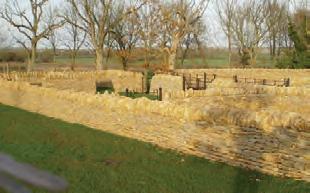
Yenstone Walling
Dry Stone Walling and Landscaping
Patrick Houchen - DSWA member
Tel: 01963 371123
www.yenstonewalling.co.uk
POLYTUNNELS

POLYTUNNELS FROM £499 AVAILABLE TO VIEW BY APPOINTMENT
01363 84948 info@ferrymanpolytunnels.co.uk
www.ferrymanpolytunnels.co.uk
SEED SUPPLIERS



THE
BLACKSMITH
jonne@jonne.co.uk
07770 720 373
Artist blacksmith based near Axminster designing and manufacturing garden plant supports, structures, garden art and fine art bronzes. Commissions welcomed.
www.thegardenersblacksmith.co.uk
SPECIALIST GARDEN PRODUCTS



 BED & BREAKFAST
CARDS & GIFTS
GARDEN
BED & BREAKFAST
CARDS & GIFTS
GARDEN
Top Quality Perennials, Shrubs & Trees
T: 01460 239569
E: fortonnursery@btconnect.com
W: www.fortonnursery.co.uk
Forton village, near Chard TA20 4HD
Closed Tuesdays and Wednesdays

Est. 2003
Growers Organics, Kitley Farm, Yealmpton, Devon PL8 2LT
www.growersorganics.com
Tel: 01752 881180


Stockists of frostproof pots and garden ornaments from Greece and around the world as well as a host of other gifts and bits and pieces
Open every day
Eastoke Corner, Hayling Island, Hants P011 9LU 02392 637590
WANT THIS SPACE?
ADVERTISE HERE FROM JUST £2 PER WORD

Email: classified@countrygardener.co.uk for more details
With the largest portfolio of coir product varieties in the UK market, CoirProducts. co.uk of Salike, is now bringing its coir potting mix in 50L bags. Natural and peat-free, the 50L coir bags are a treat to any garden lover. Easy to use and store, the potting mix bags are ideal for growing a variety of plants and crops.
A sustainable by-product of the coconut industry, coir is derived from the dust and fibres of the coconut husk. Completely peat-free, coir has been growing in popularity as an alternative to the more harmful peat-based growing products. The natural properties of coir means it also has excellent water holding capacity and air porosity, as well as facilitating drainage. Such properties allow plants to access the moisture, while draining excess amounts of water, helping them grow stronger and healthier root systems within appropriate growing conditions.


Garden clubs and associations are starting to fill up their events calendar for the new season. If you would like to share club events then take advantage of our traditional free service which lists events, meetings and outings. Send your information to timeoff@countrygardener.co.uk
16TH
Plympton Gardeners Association SPRING SHOW
Details on 01752 336057
18TH
Meavy Garden Society SPRING FLOWER SHOW
Details on 01822 852672
20TH
Torquay & District Garden Club
‘HISTORY OF GARDEN DESIGN’
- DIANNE LONG
email: nickibaker222@gmail.com
21ST
Lympstone Garden Club
‘PLANTS FOR SHADE’ - SAUL WALKER
26TH
Crediton Garden Club
‘PRIMROSES, FACY & FEATHERED’
- CAROLINE STONE
28TH
Budleigh Salterton Garden Club
‘EDWARDIAN GARDENS’ - CHRISTINE
STONES
Details on 01395 445840
3RD
Brixham Horticultural Society MONTHLY MEETING
Details on 0180 842121
4TH
Plympton Gardeners Association
‘TREWITHEN PAST & PRESENT’
- GARY LONG
Details on 01752 36057
The larger coir potting mix bags are crafted to meet the diverse needs of gardeners and growers. The range includes CoirProducts’ signature peat-free coir potting mix, Coir Vital Grow. Designed for easy and convenient use, Coir Vital Grow is ideal for seasoned growers or those new to gardening. The potting mix range also includes two new products, Coir Plus, which is enriched with NPK, providing plants with essential elements for healthy and robust growth as well as the revolutionary Coir Nutri. A multi-purpose compost, a first of its kind in the market, this specially-formulated mix blends age-old traditions with the inherent goodness of coir. The added benefits of nitrogen, phosphorus, and potassium, give plants the extra boost for optimal thriving. CoirProducts’ parent company, Salike, is carbon neutral compliant with ISO 14064-3 : 2019, and continues to adopt ethical practices in the producing and sourcing of its products. With innovation and sustainability at the heart of its approach, CoirProducts remains committed to highlighting the transformative power of gardening.
South Devon Alpine Garden Society
MEMBERS SHOW & PLANT DISPLAY
Teignmouth Gardening Club
‘HANGING BASKETS’ - MICHAEL SALTER
Details on 07976 797017
9TH
Exminster Gardening Club
‘SHADE GARDENING’ - SAUL WALKER
Details on 01392 832762
Woodbury Garden Club ‘FUCHSIAS’
Details on 07470 022039
10TH
Goodleigh Horticultural Society
‘COMPOST & NO DIG GARDENING’
- DR.COMPOST
15TH
Meavy Garden Society
‘STONELANDS HOUSE AND GARDENS: A GARDEN OF HIDDEN BEAUTY’
- SAUL WALKER
Details on 01822 852672
17TH
Torquay and District Garden Club
‘VEGETABLE GARDENING’
- BEN THORNTON
email: nickibaker222@gmail.com
18TH
Lympstone Garden Club
‘WILDLIFE ON MY ORGANIC FARM’
- MARTIN GODFREY
23RD
Crediton Garden Club
‘HELLEBORES & FRIENDS’
- JULIAN SUTTON
At Crediton Library
25TH
Budleigh Salterton Garden Club
‘WORKING WITH WILLOW’
- RICHARD KERWOOD
Details on 01395 445840

life or death?

You are walking across the Sahara Desert in the middle of the day, and it is very hot. All you have to protect you from the sun’s rays is a parasol. As you look ahead the parasol blocks some of your view. Annoyed by this interruption of your view, you cast the parasol aside. You walk on now unprotected from the scorching heat.
Is this a good idea?
In 2012 154,000 air conditioning units were sold in the UK. By 2021 this had increased to 213,000 for the year. Over the whole survey period 2,105,000 air conditioning units were sold. Recently the electricity demand to power these units in a heatwave forced the electricity generating companies to resort to firing up some coal-fired power stations to prevent the collapse of the grid.
Is this a good idea? Trees cool the air.
In the summer our rivers run dry or low. Lack of rainfall is blamed. Water companies’ abstraction is blamed, housing development is blamed. (They would blame 4x4s if they could think of a reason!) Nobody mentions evaporation. Why not? 14 per cent of lake and river water is lost through evaporation and it can only get worse. The dwindling, though doughty, band of us who knew the British countryside before Dutch Elm Disease remember a countryside with a great many more trees (about 60 million more trees) and consequently a lot more shade.
The Woodland Trust is offering encouragement to people to plant trees alongside rivers because trees next to rivers cast shade over the water, which regulates the river temperature and nutrient levels. This helps to prevent algal blooms and keeps the aquatic ecosystem in balance. Our native fish are shrinking and dying because the water in our rivers and streams is becoming too warm. Should this be left to a charity to try and cure, or should it be a national emergency?
At an arboricultural conference I attended, the Government sent its appointed 'Trees Champion’ to deliver the keynote address.
Sir Limp-Wrist-Twisleton-Smyth III couldn’t have been more out of touch: “You tree chappies will be delighted to hear that your government is committed to planting 4,000,000 new trees next year."
Mark Hinsley says the need to plant more trees is on the edge of a national emergency and we need a rapid change in our attitudes
A professional tree grower in the front of the audience asked him, “Has anybody thought to tell the nursery industry so that we can grow them?”
Oh dear! Bang goes the OBE!
Since 1900 in England and Wales we have lost more than half of our orchards. We produce about 60 per-cent of the food we eat in this country – but only 18per-cent of our fruit. Traditional orchards are a UK Biodiversity Action Plan Priority Habitat because of their high value for wildlife conservation. We currently import about 80 per cent of the timber we use.
The earliest evidence we have for the management of trees in the UK for produce is the use of coppicing to create the materials for trackways in the Somerset levels dating back to 4,500 years BC.
Over the last 6,500 years our precious indigenous wildlife has evolved/developed to live in a productive landscape, perhaps not intensively productive, but not unmanaged wildwood.
We desperately need more trees – in our towns and our countryside. The main responsibility for those trees will fall on individual landowners.
For that to work they need to see value in those trees. We need to value homegrown fruit, homegrown timber, shade and shelter.
We need to change our attitudes as landowners and consumers.
We have lost trees to disease – we have lost more to commercial pressures – we need to make them valuable again.
Mark Hinsley, of Mark Hinsley Arboricultural Consultants Ltd, offering tree consultancy services.
www.treeadvice.info

